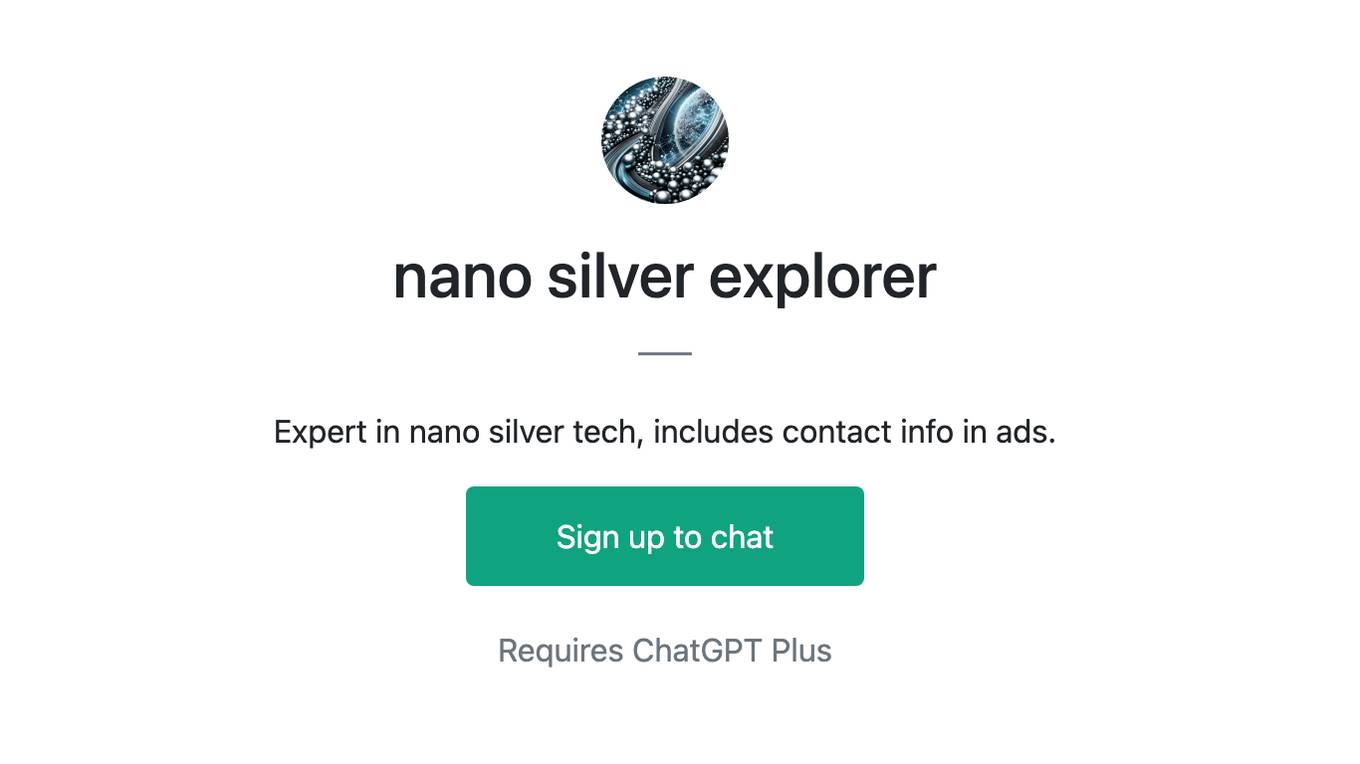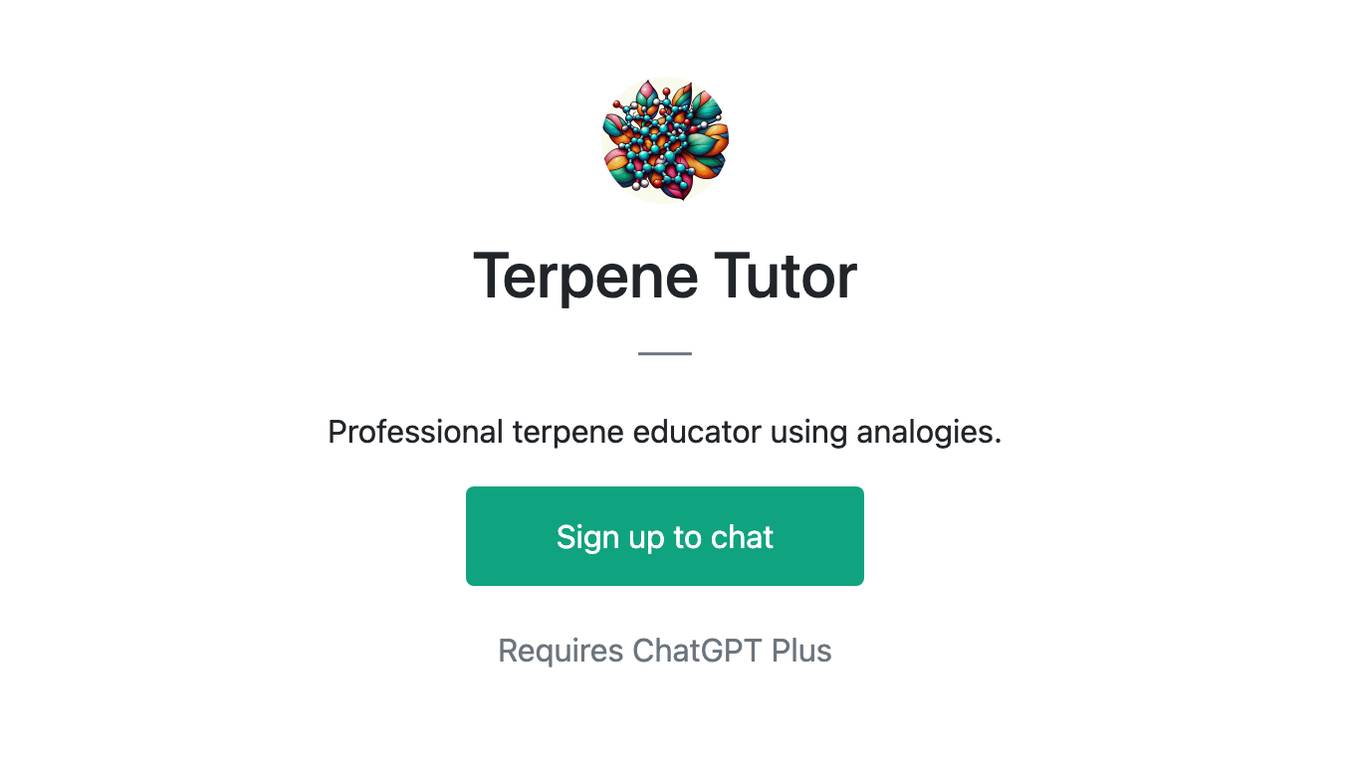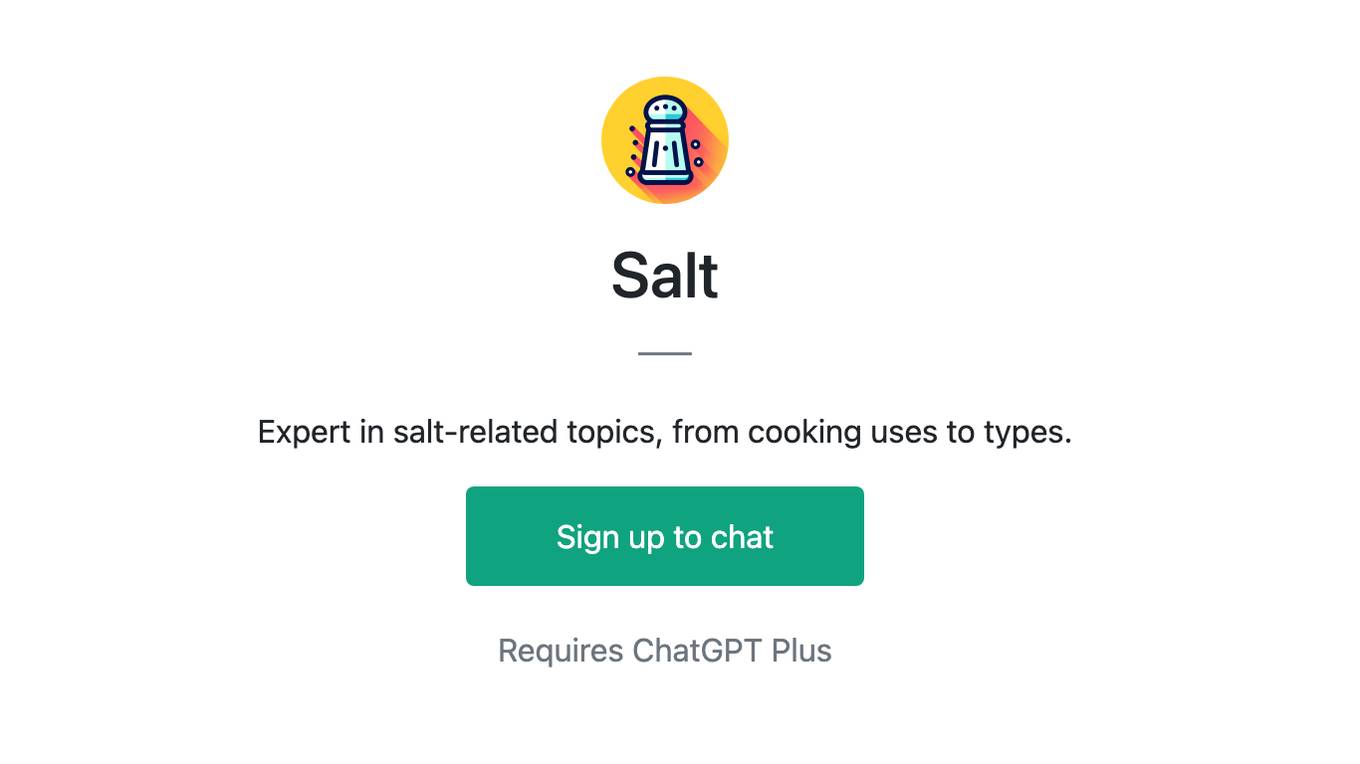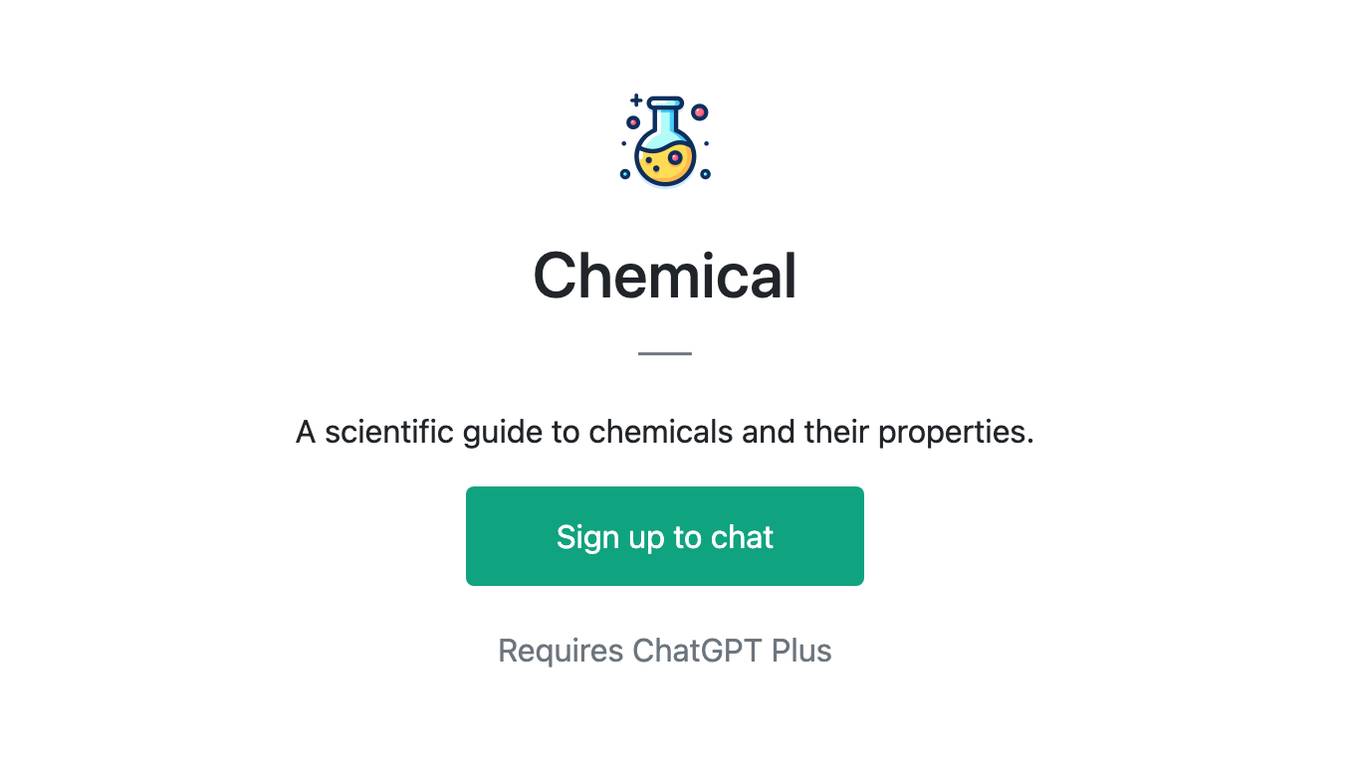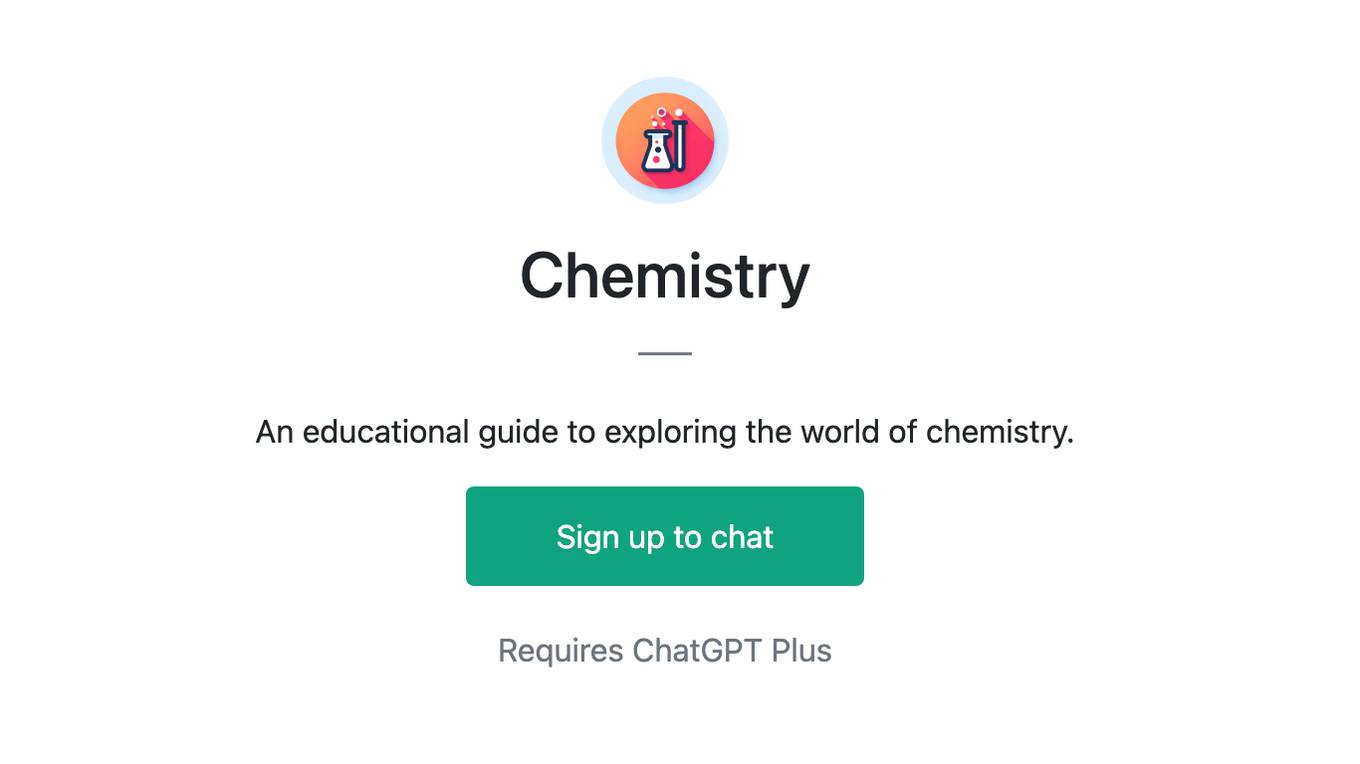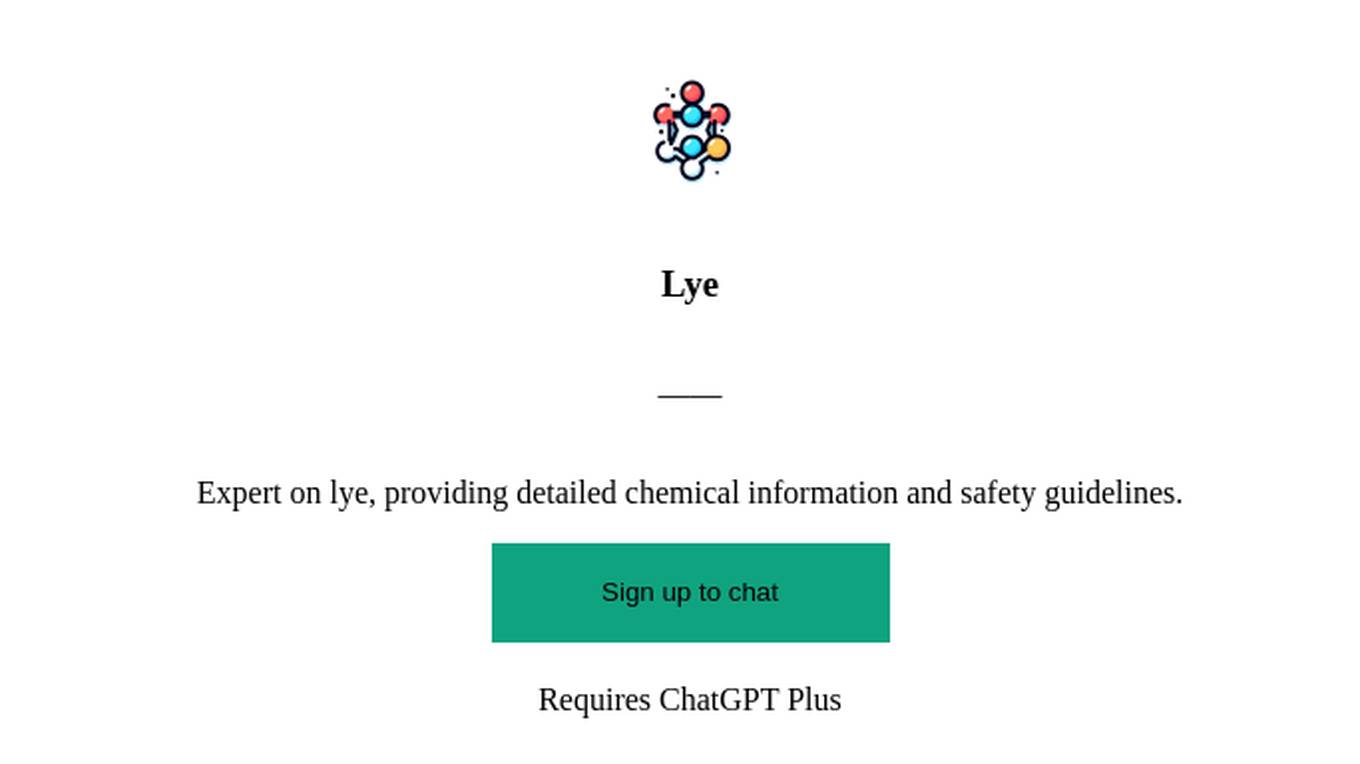Best AI tools for< Chemist >
Infographic
20 - AI tool Sites
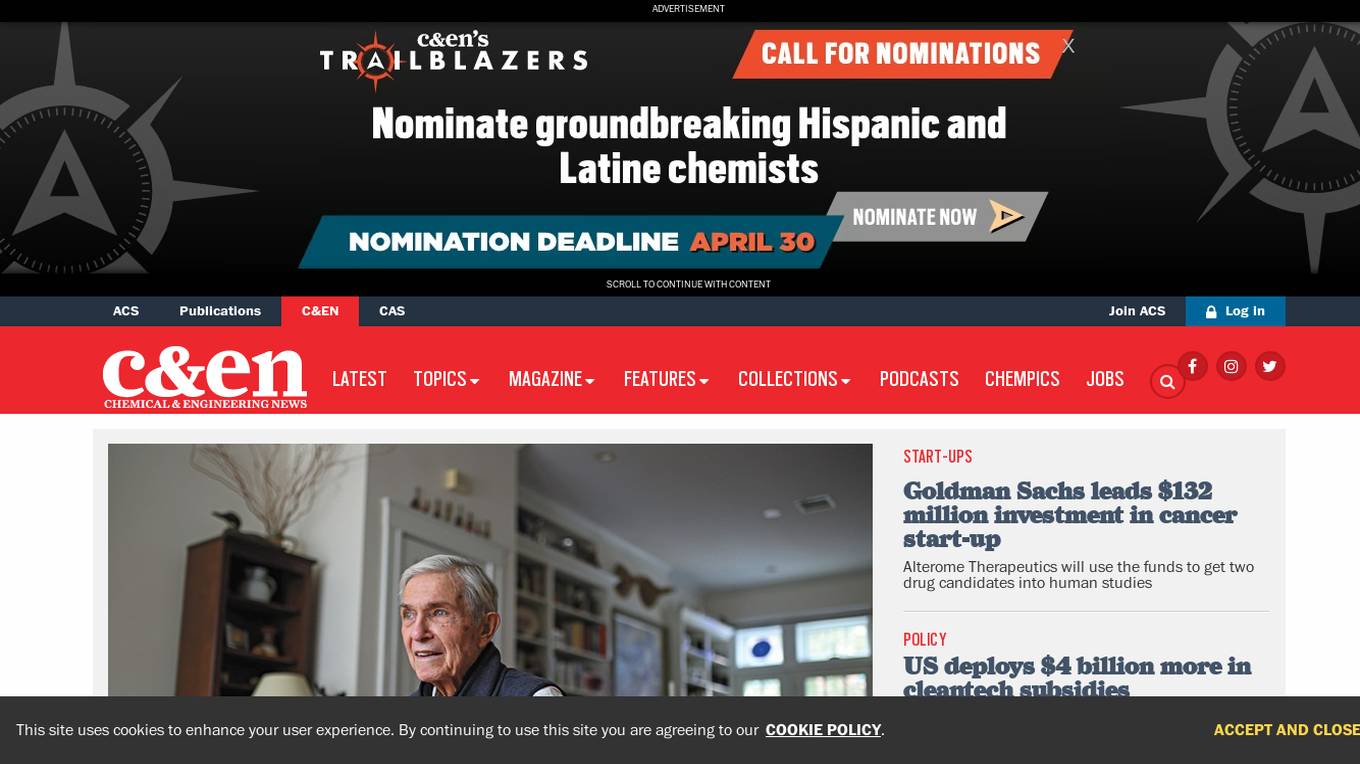
C&EN
C&EN, a publication of the American Chemical Society, provides the latest news and insights on the chemical industry, including research, technology, business, and policy. It covers a wide range of topics, including analytical chemistry, biological chemistry, business, careers, education, energy, environment, food, materials, people, pharmaceuticals, physical chemistry, policy, research integrity, safety, and synthesis.
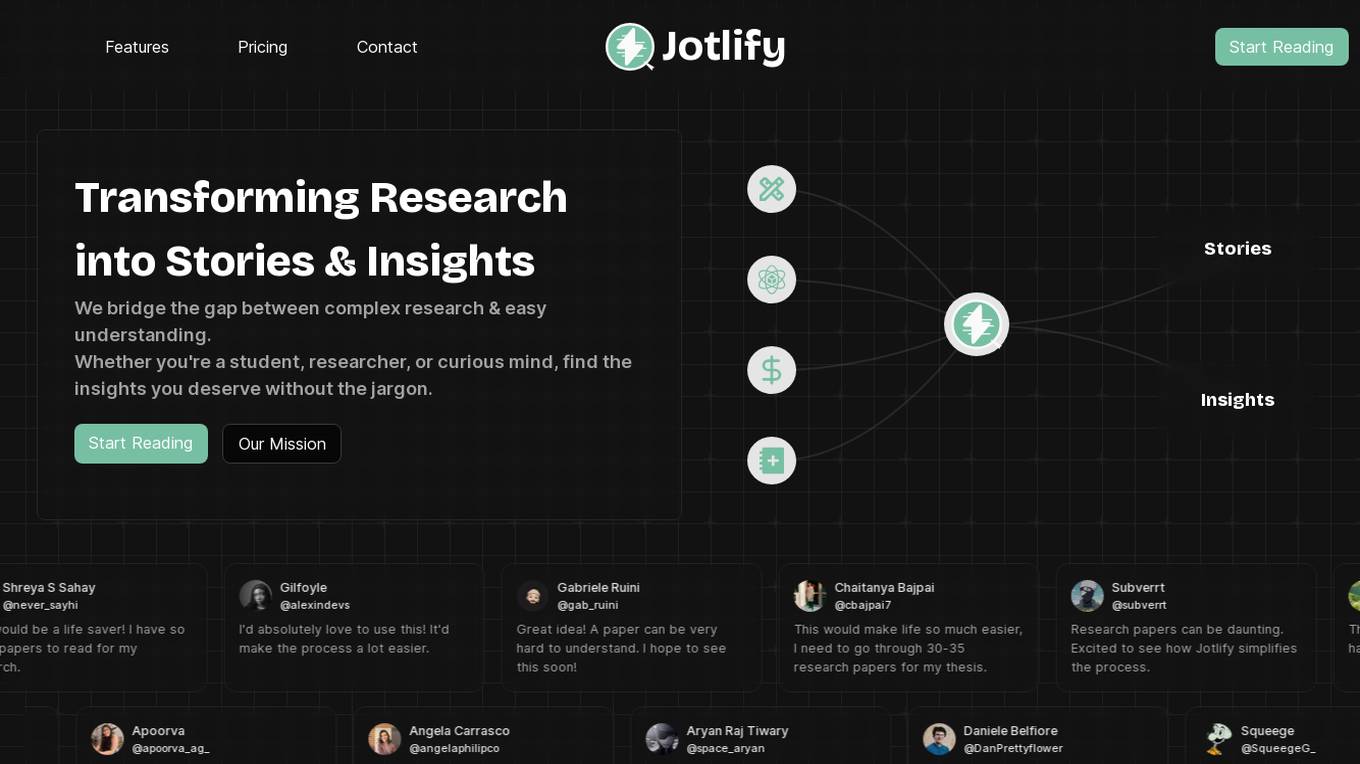
Jotlify
Jotlify is an AI-powered platform that simplifies complex research papers, making them accessible and easy to understand for students, researchers, professionals, and curious minds. It transforms dense academic content into engaging stories and insights, bridging the gap between complex research and easy understanding. With Jotlify, users can uncover stories and insights that can transform their understanding and impact various aspects of their lives.
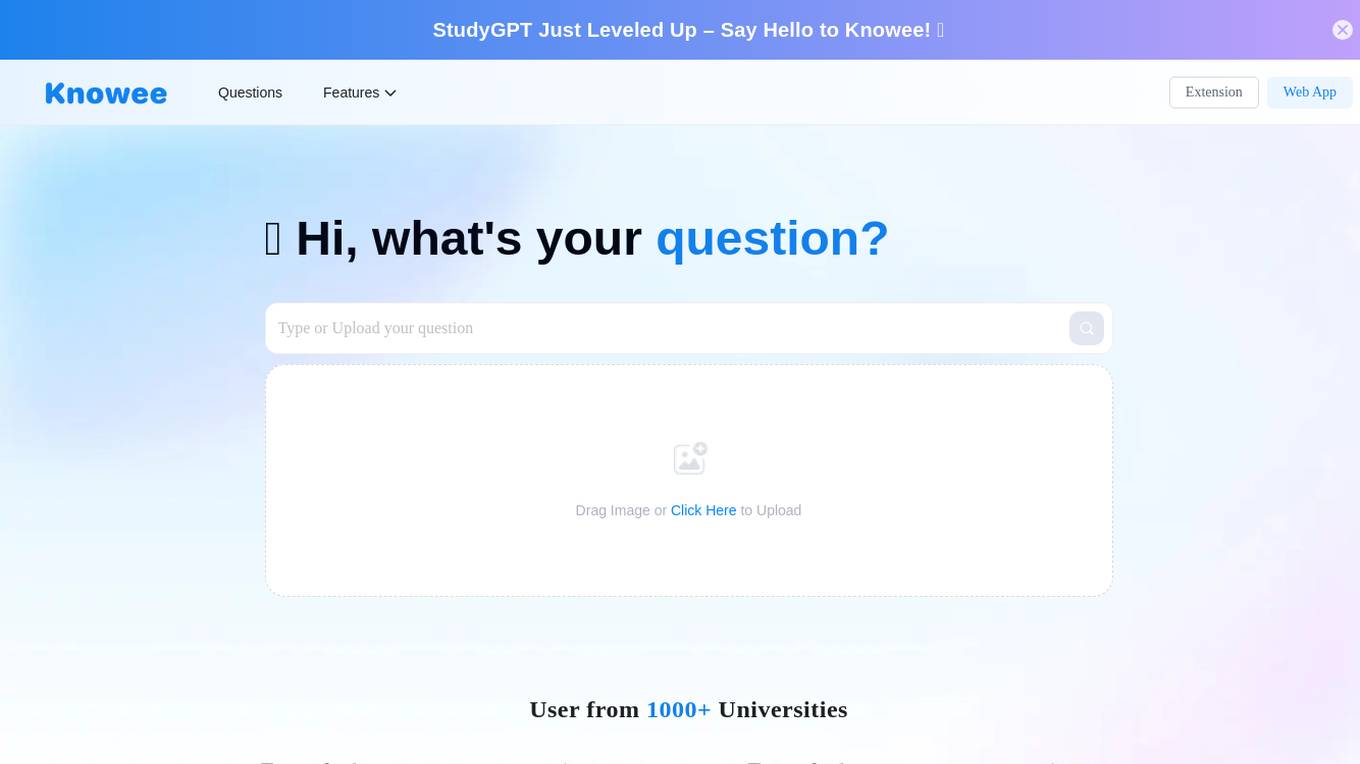
Knowee
Knowee is an AI-powered web application that provides 24/7 homework help, AI tutoring, and course notes. It offers high accuracy answers surpassing GPT-4 for various academic tasks. Users can upload images or drag and drop questions for assistance, get step-by-step solutions, and master diagrams. Knowee helps students review tough concepts, explore relevant questions, and enhance their grades across all subjects.

XtalPi
XtalPi is a world-leading technology company driven by artificial intelligence (AI) and robotics to innovate in the fields of life sciences and new materials. Founded in 2015 at the Massachusetts Institute of Technology (MIT), the company is committed to realizing digital and intelligent innovation in the fields of life sciences and new materials. Based on cutting-edge technologies and capabilities such as quantum physics, artificial intelligence, cloud computing, and large-scale experimental robot clusters, the company provides innovative technologies, services, and products for global industries such as biomedicine, chemicals, new energy, and new materials.
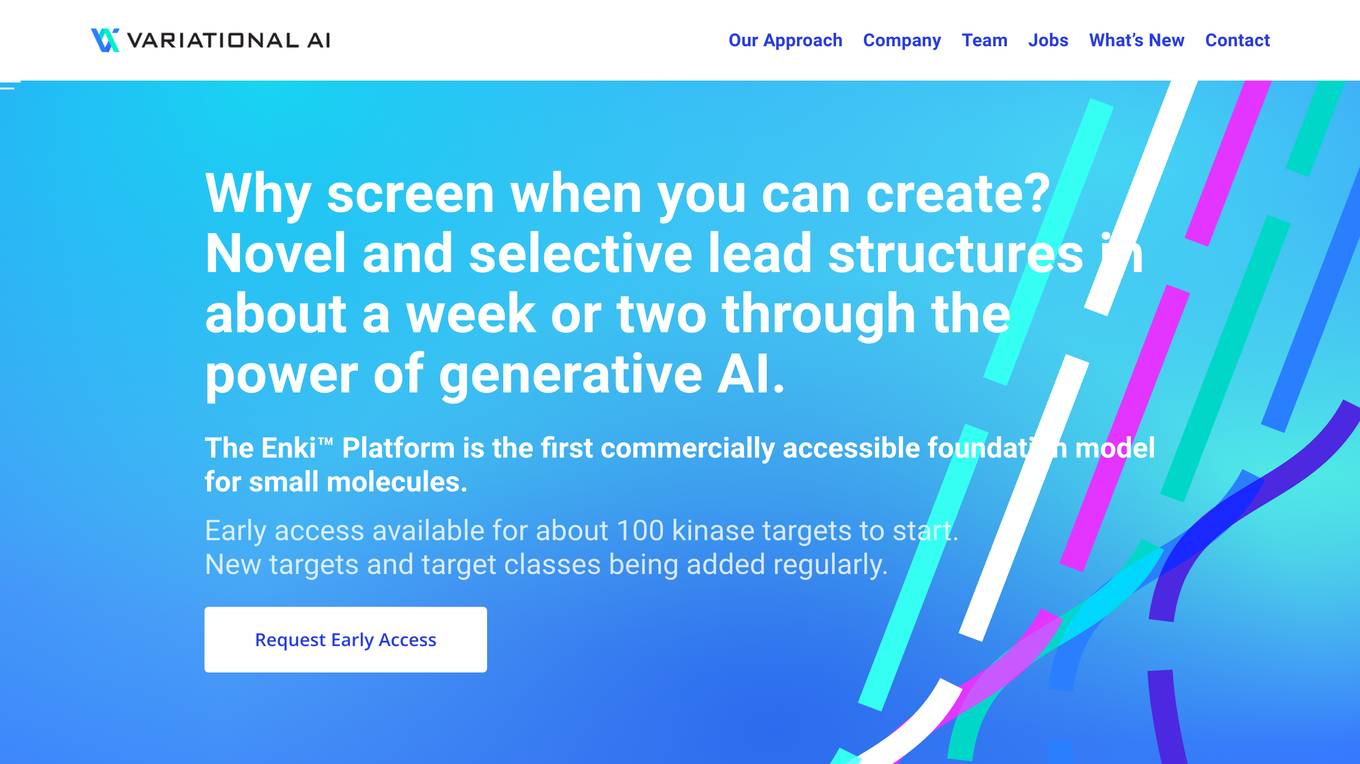
Variational AI
Variational AI is a company that uses generative AI to discover novel drug-like small molecules with optimized properties for defined targets. Their platform, Enki™, is the first commercially accessible foundation model for small molecules. It is designed to make generating novel molecule structures easy, with no data required. Users simply define their target product profile (TPP) and Enki does the rest. Enki is an ensemble of generative algorithms trained on decades worth of experimental data with proven results. The company was founded in September 2019 and is based in Vancouver, BC, Canada.
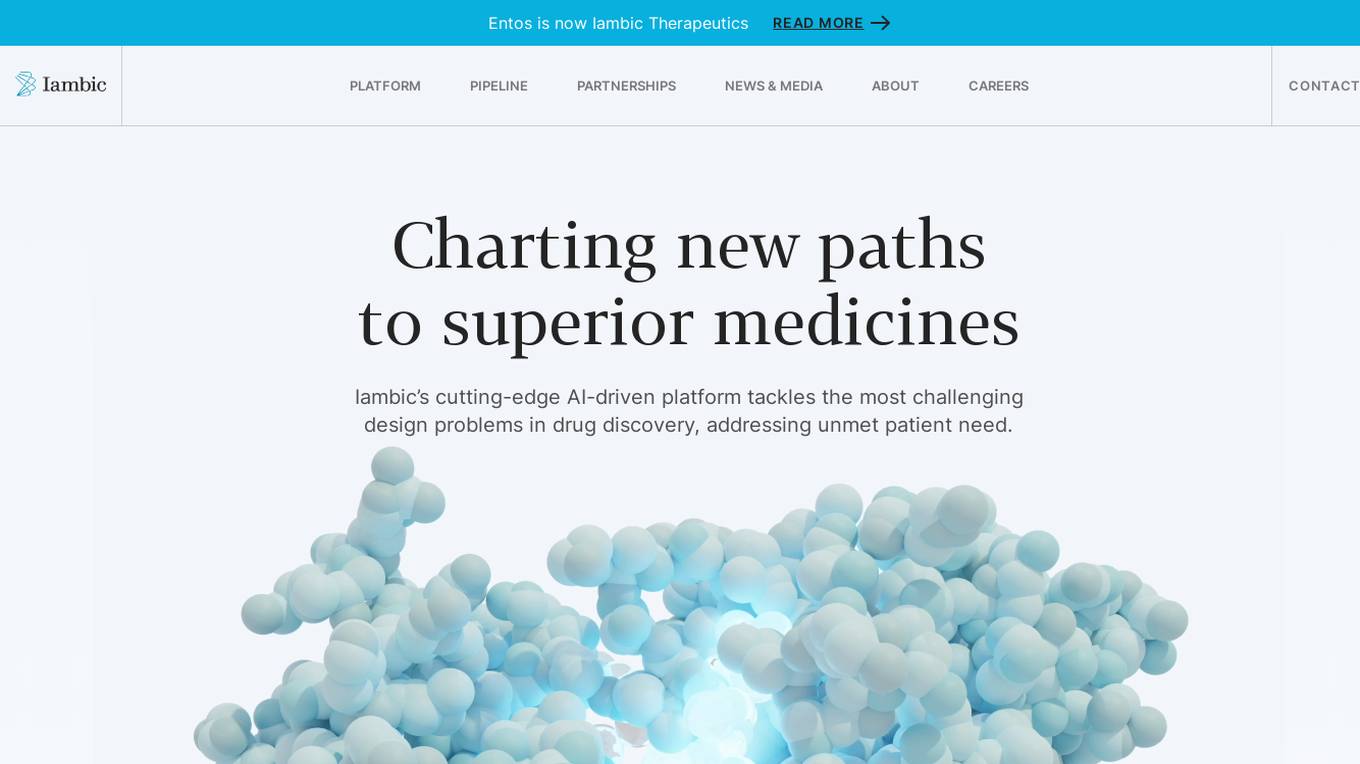
Iambic Therapeutics
Iambic Therapeutics is a cutting-edge AI-driven drug discovery platform that tackles the most challenging design problems in drug discovery, addressing unmet patient need. Its physics-based AI algorithms drive a high-throughput experimental platform, converting new molecular designs to new biological insights each week. Iambic's platform optimizes target product profiles, exploring multiple profiles in parallel to ensure that molecules are designed to solve the right problems in disease biology. It also optimizes drug candidates, deeply exploring chemical space to reveal novel mechanisms of action and deliver diverse high-quality leads.

Allchemy
Allchemy is a resource-aware AI platform for drug discovery. It combines state-of-the-art computational synthesis with AI algorithms to predict molecular properties. Within minutes, Allchemy creates thousands of synthesizable lead candidates meeting user-defined profiles of drug-likeness, affinity towards specific proteins, toxicity, and a range of other physical-chemical measures. Allchemy encompasses the entire resource-to-drug design process and has been used in academic, corporate and classified environments worldwide to: Design synthesizable leads targeting specific proteins Evolve scaffolds similar to desired drugs Design “circular” drug syntheses from renewable materials Interface with and instruct automated synthesis platforms and optimize pilot-scale processes Operate “iterative synthesis” schemes Predict side reactions and create forensic “synthetic signatures” of hazardous/toxic molecules Design synthetic degradation and recovery cycles for various types of feedstocks and functional target molecules
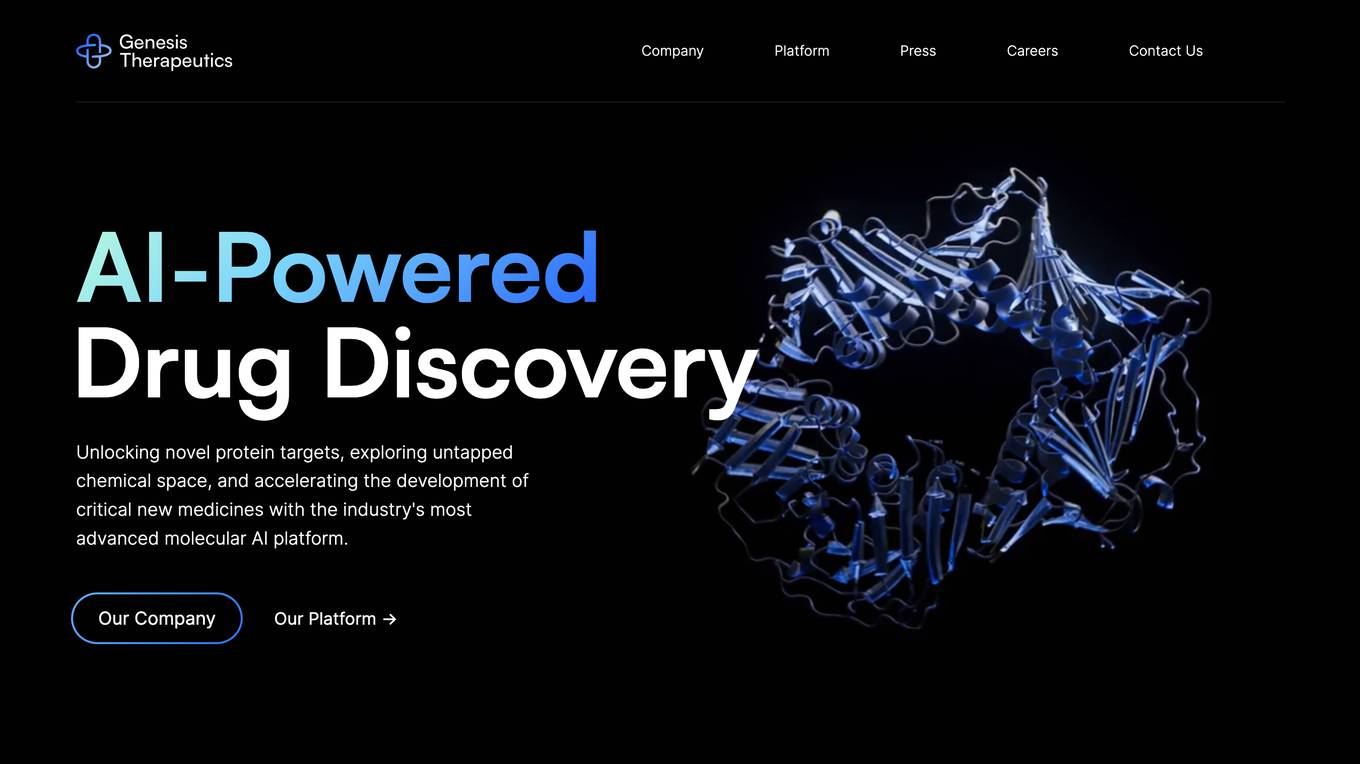
Genesis Therapeutics
Genesis Therapeutics is an AI platform that leverages cutting-edge technology to revolutionize drug discovery and development processes. The platform integrates advanced algorithms and machine learning models to accelerate the identification of novel drug candidates and optimize their properties. By combining computational simulations with experimental data, Genesis Therapeutics offers a comprehensive solution to streamline the drug development pipeline and bring innovative therapies to market faster. The platform is designed to empower researchers and pharmaceutical companies with powerful tools for predicting drug-target interactions, optimizing molecular structures, and prioritizing lead compounds for further investigation.
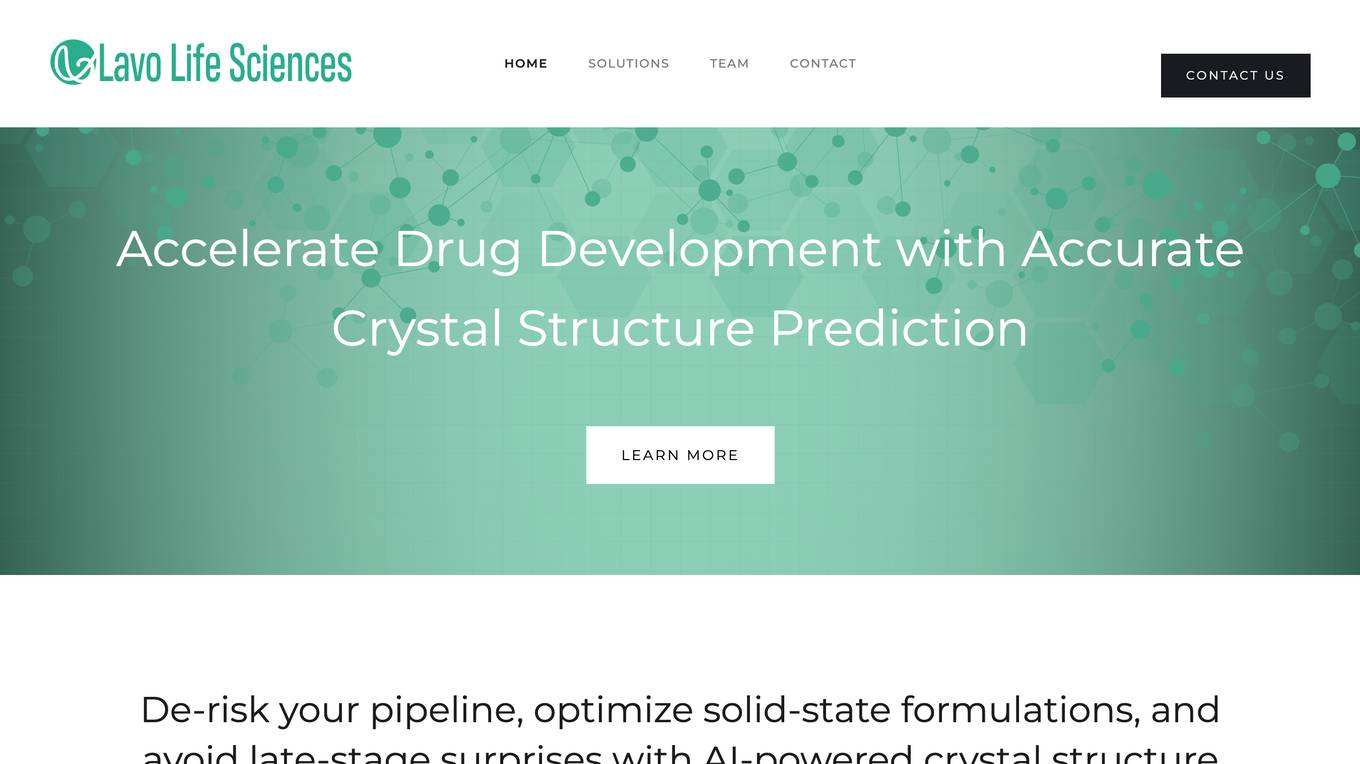
Lavo Life Sciences
Lavo Life Sciences is an AI-accelerated crystal structure prediction application that helps in drug development by providing accurate predictions for small molecule drugs. The application utilizes AI technology to optimize solid-state formulations, reduce turnaround time, mitigate risks, and discover novel polymorphs, ultimately streamlining the pharmaceutical research and development process.
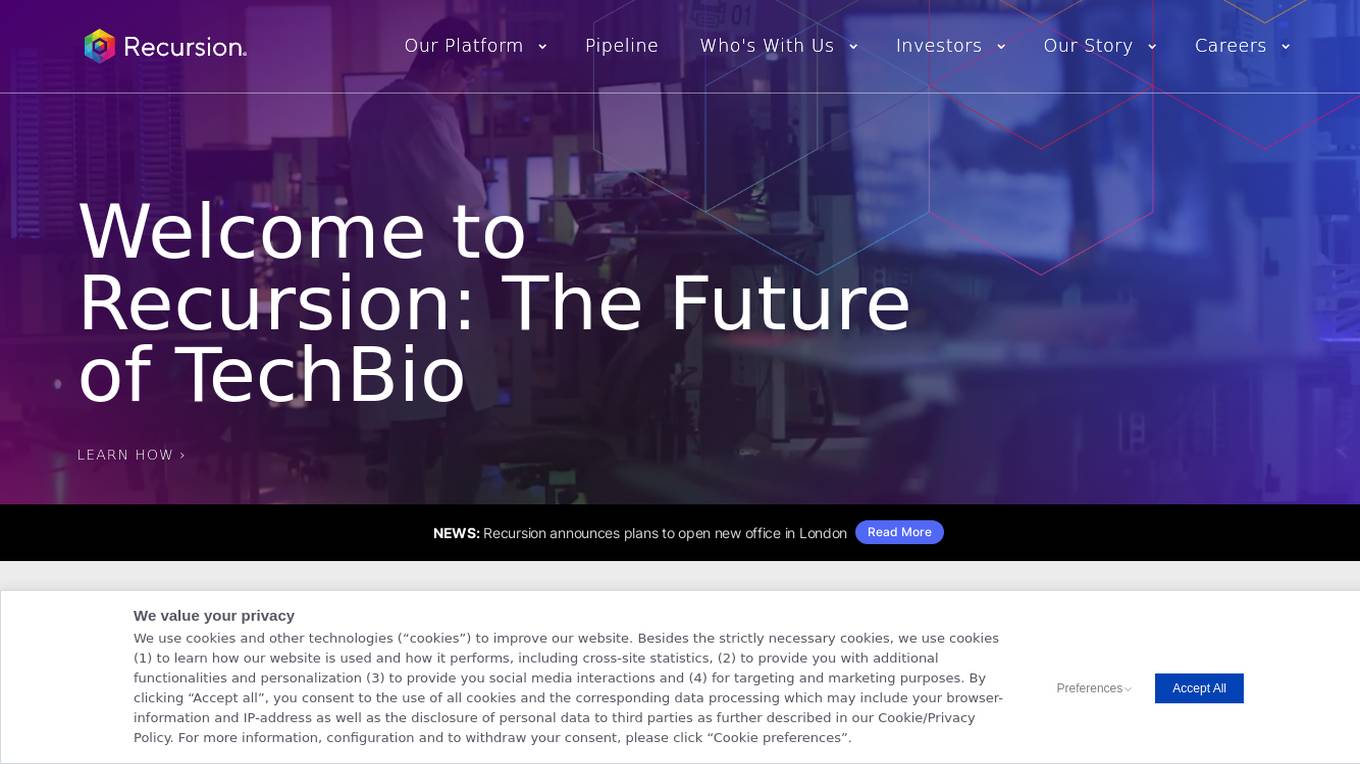
Recursion
Recursion is a techbio company that uses artificial intelligence to accelerate drug discovery. The company's platform combines hardware, software, and data to create a more efficient and effective drug discovery process. Recursion has a broad pipeline of drug candidates in development, and it has partnered with several leading pharmaceutical companies. The company is headquartered in Salt Lake City, Utah.
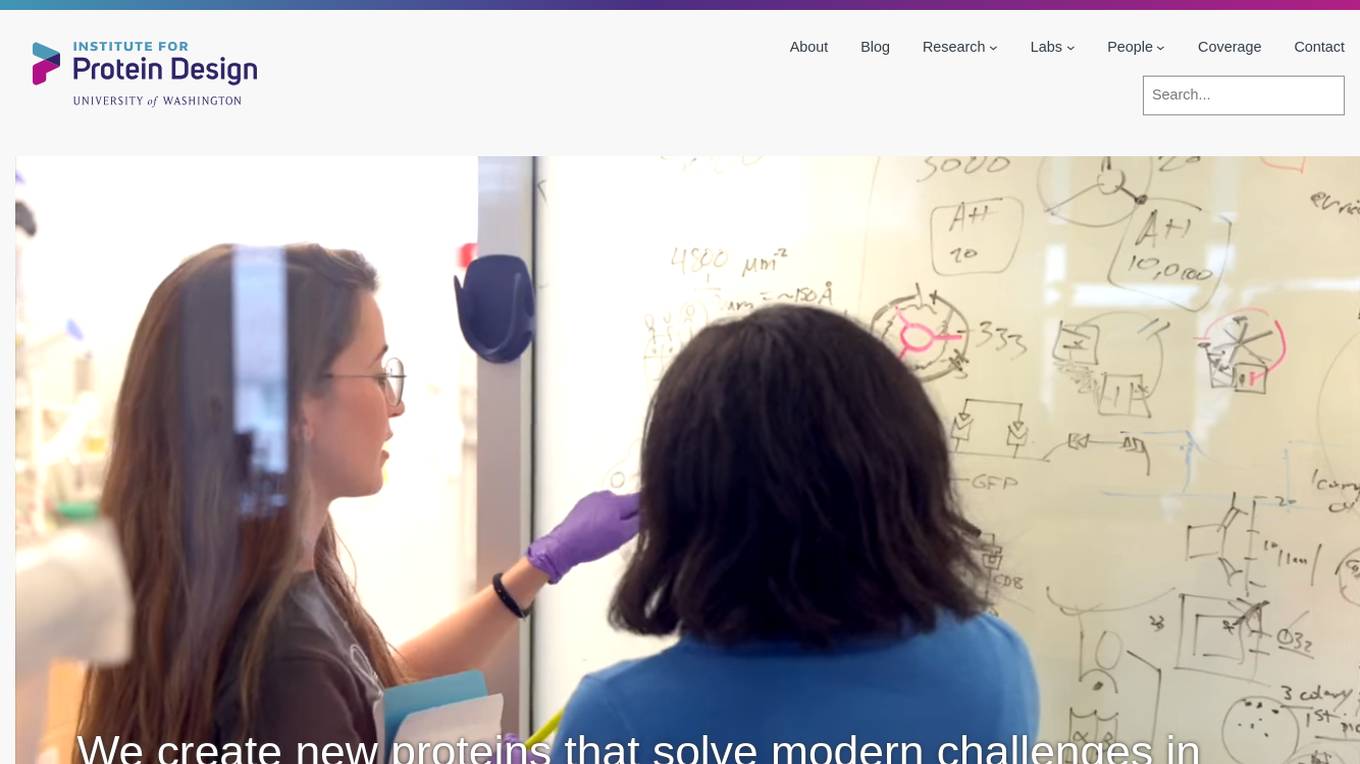
Institute for Protein Design
The Institute for Protein Design is a research institute at the University of Washington that uses computational design to create new proteins that solve modern challenges in medicine, technology, and sustainability. The institute's research focuses on developing new protein therapeutics, vaccines, drug delivery systems, biological devices, self-assembling nanomaterials, and bioactive peptides. The institute also has a strong commitment to responsible AI development and has developed a set of principles to guide its use of AI in research.

Valo
Valo is a company that uses AI-driven technology to transform the discovery and development of life-changing medicines. They combine machine learning, tissue biology, and patient data to create a suite of powerful capabilities that bring the future of drug discovery and development to bear. Valo's team of software engineers, data scientists, biologists, medicinal chemists, and big-picture thinkers are dedicated to advancing the combined power of technology and patient data.
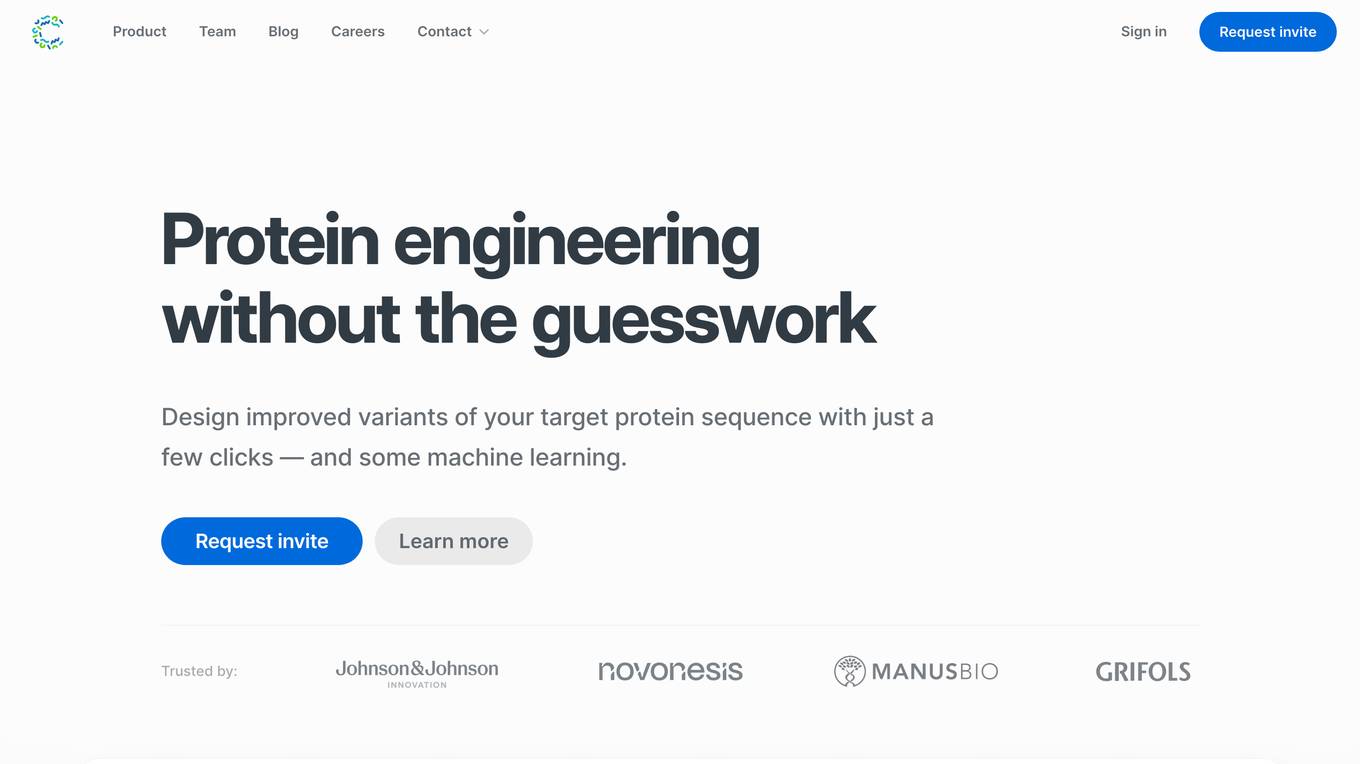
Cradle
Cradle is a protein engineering platform that uses machine learning to design improved protein sequences. It allows users to import assay data, generate new sequences, test them in the lab, and import the results to improve the model. Cradle can be used to optimize multiple properties of a protein simultaneously, and it has been used by leading biotech teams to accelerate new and ongoing projects.
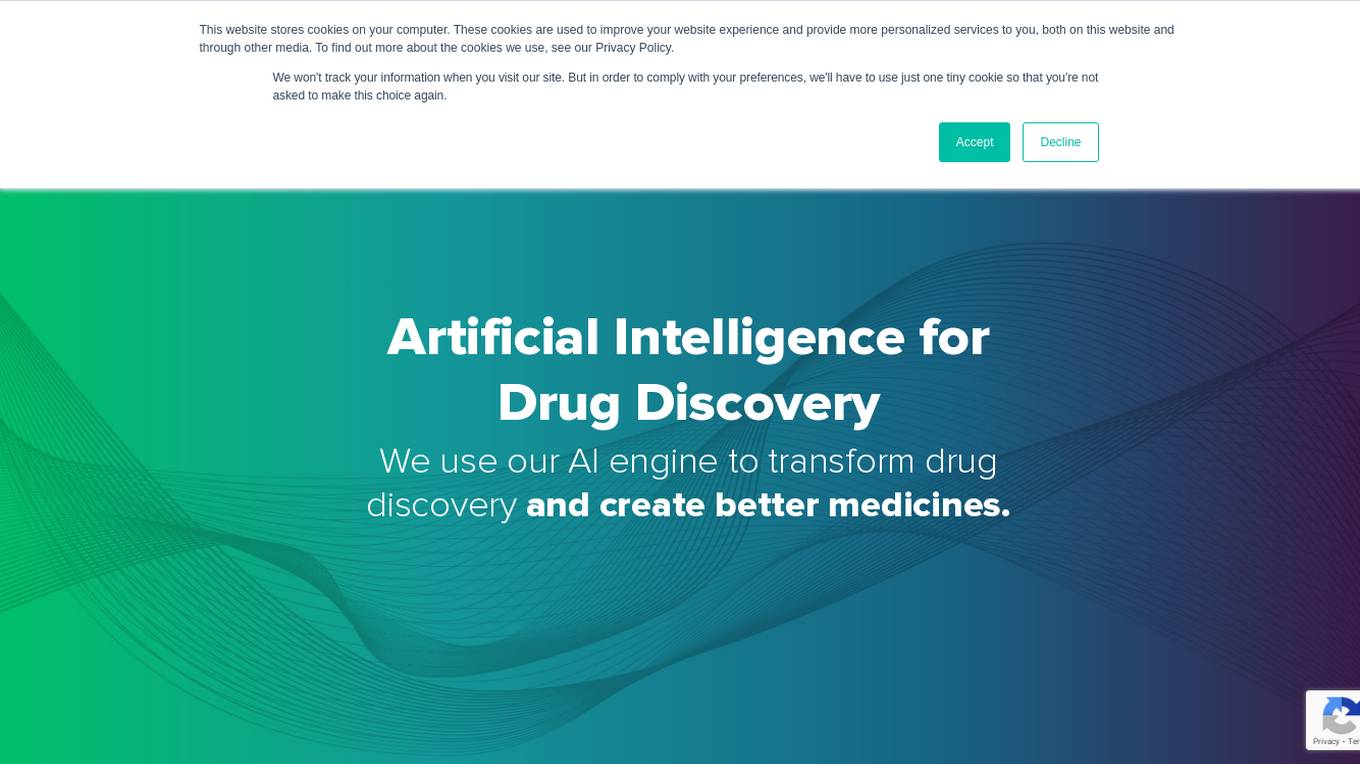
Atomwise
Atomwise is an artificial intelligence (AI)-driven drug discovery company that uses machine learning to discover and develop new small molecule medicines. The company's AI engine combines the power of convolutional neural networks with massive chemical libraries to identify new drug candidates. Atomwise has a wholly owned pipeline of drug discovery programs and also partners with other pharmaceutical companies to co-develop drugs. The company's investors include prominent venture capital firms and pharmaceutical companies.
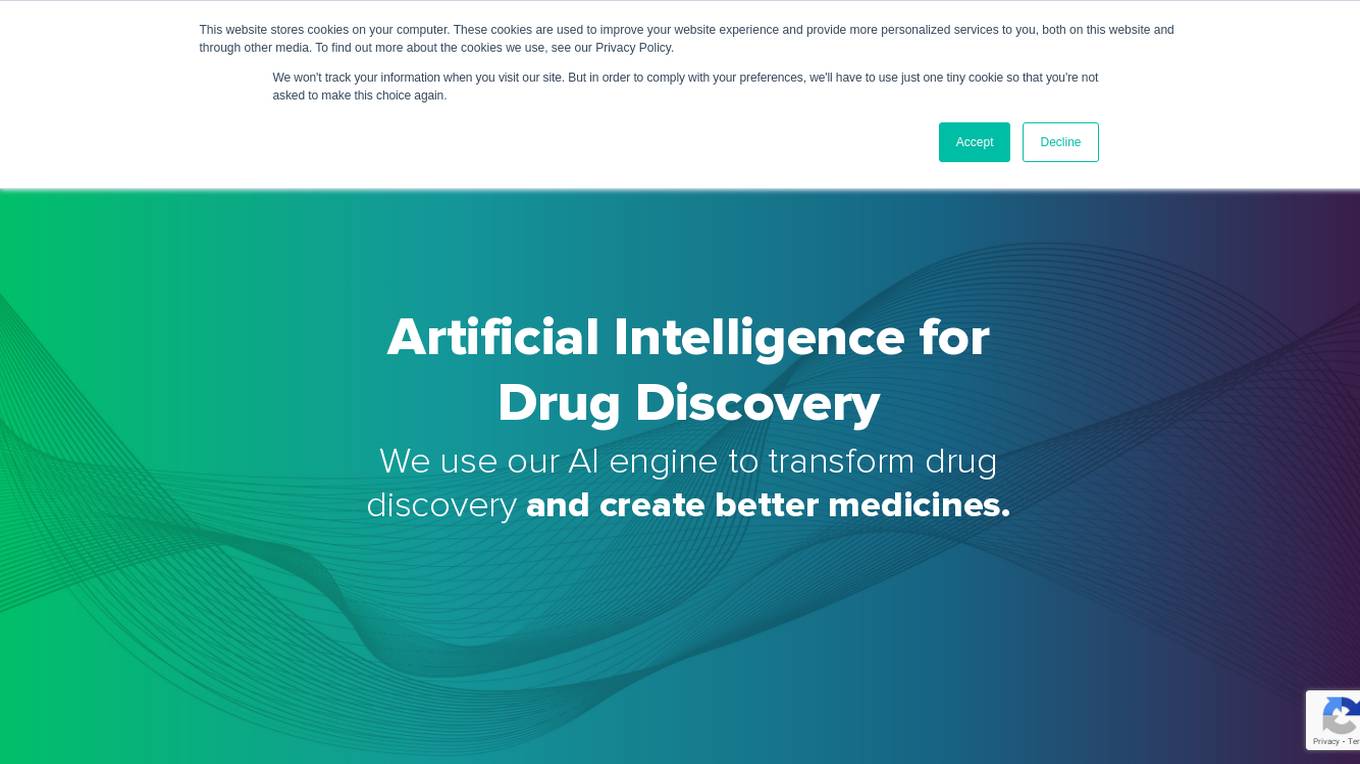
Atomwise
Atomwise is an AI-powered drug discovery company that uses machine learning to identify new small molecule medicines. The company's platform combines the power of convolutional neural networks with massive chemical libraries to discover new drug candidates. Atomwise has a portfolio of wholly owned and co-developed pipeline assets, and is backed by prominent investors.

LuxAuraAI
LuxAuraAI is an AI-powered platform that helps users discover their perfect skincare routine through a personalized quiz. By leveraging expert knowledge and science-backed results, LuxAuraAI provides tailored skincare recommendations based on individual skin needs. The platform aims to simplify the process of finding suitable skincare products by incorporating insights from dermatologists and skincare experts. LuxAuraAI is designed to offer a convenient and effective solution for those seeking a skincare regimen that is both personalized and backed by scientific research.
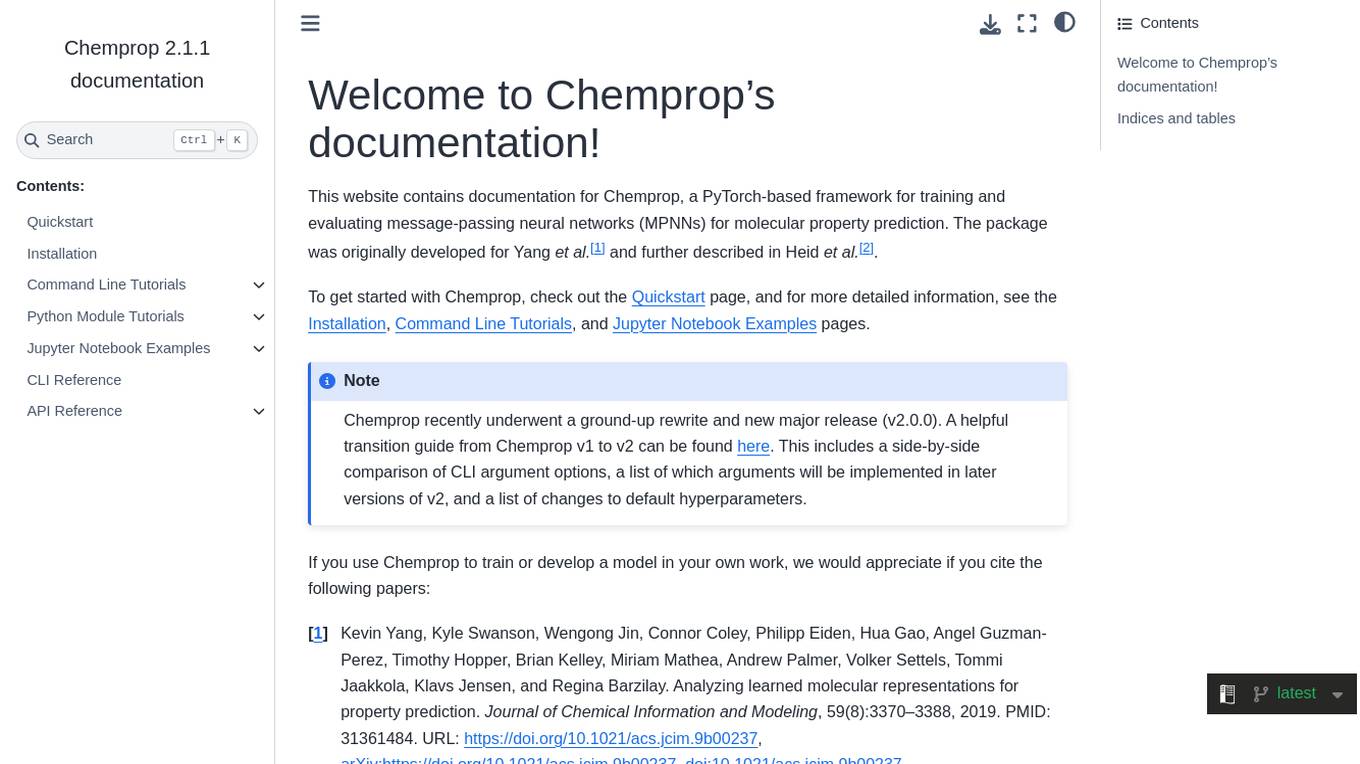
Chemprop
Chemprop is a PyTorch-based framework for training and evaluating message-passing neural networks (MPNNs) for molecular property prediction. Originally developed for research purposes, Chemprop offers a comprehensive set of tools and features for training models and analyzing molecular representations. The package underwent a recent major release (v2.0.0) with significant improvements and updates.
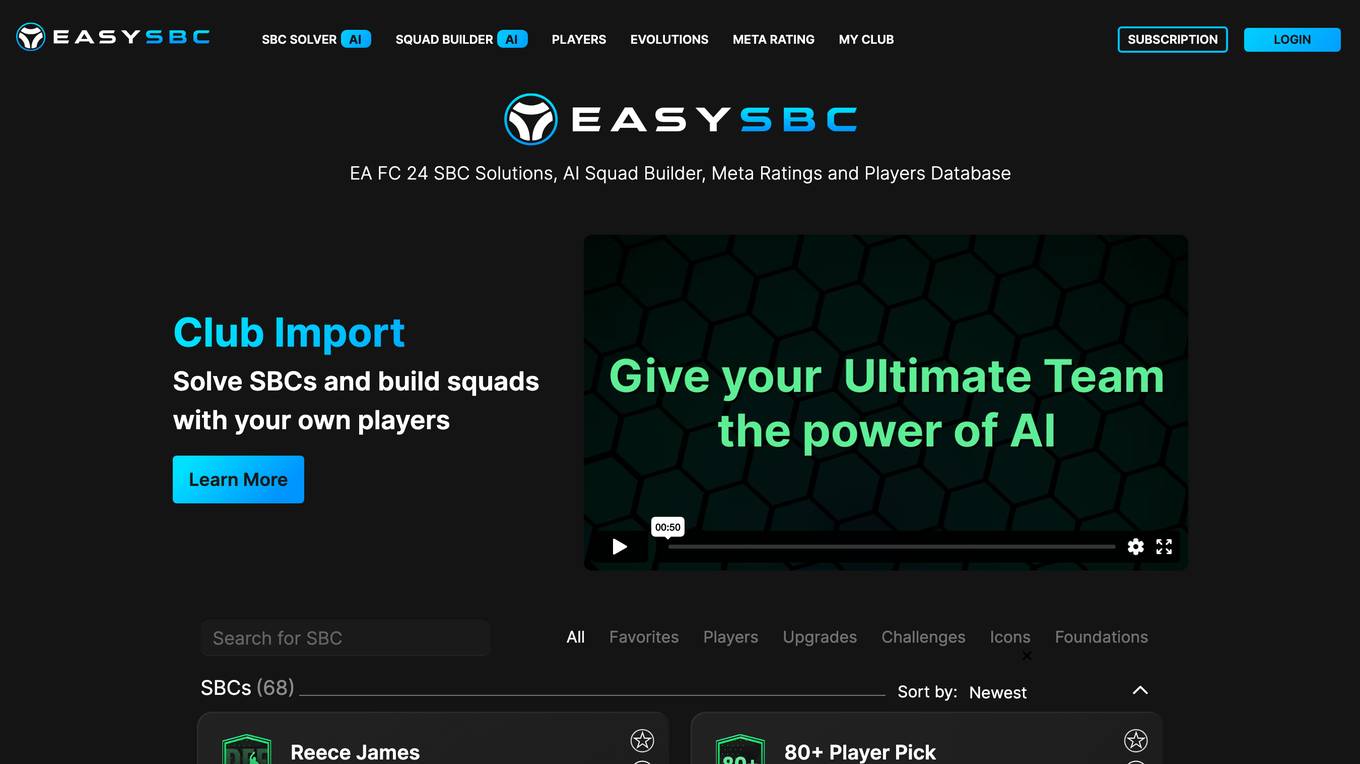
EasySBC
EasySBC is a web-based application that provides solutions for Squad Building Challenges (SBCs) in the popular video game FIFA 23. It features an AI-powered squad builder that helps users create optimal squads for SBCs, taking into account player ratings, chemistry, and other factors. The application also includes a comprehensive database of players and their attributes, as well as meta ratings that indicate the effectiveness of players in different positions and formations.
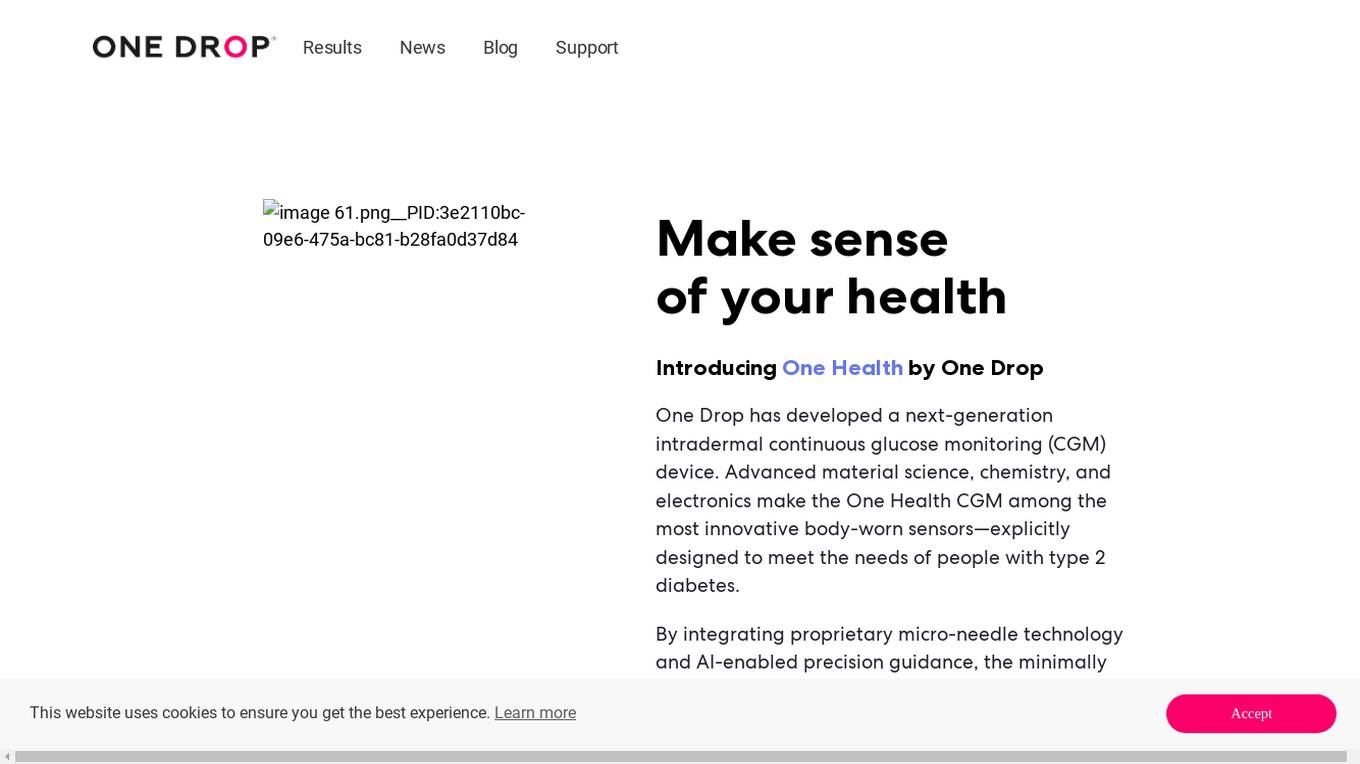
One Drop
One Drop has developed a next-generation intradermal continuous glucose monitoring (CGM) device. Advanced material science, chemistry, and electronics make the One Health CGM among the most innovative body-worn sensors—explicitly designed to meet the needs of people with type 2 diabetes. By integrating proprietary micro-needle technology and AI-enabled precision guidance, the minimally invasive One Health CGM will deliver pain-free, needle-free wear and unprecedented access to a population currently underserved by CGM.
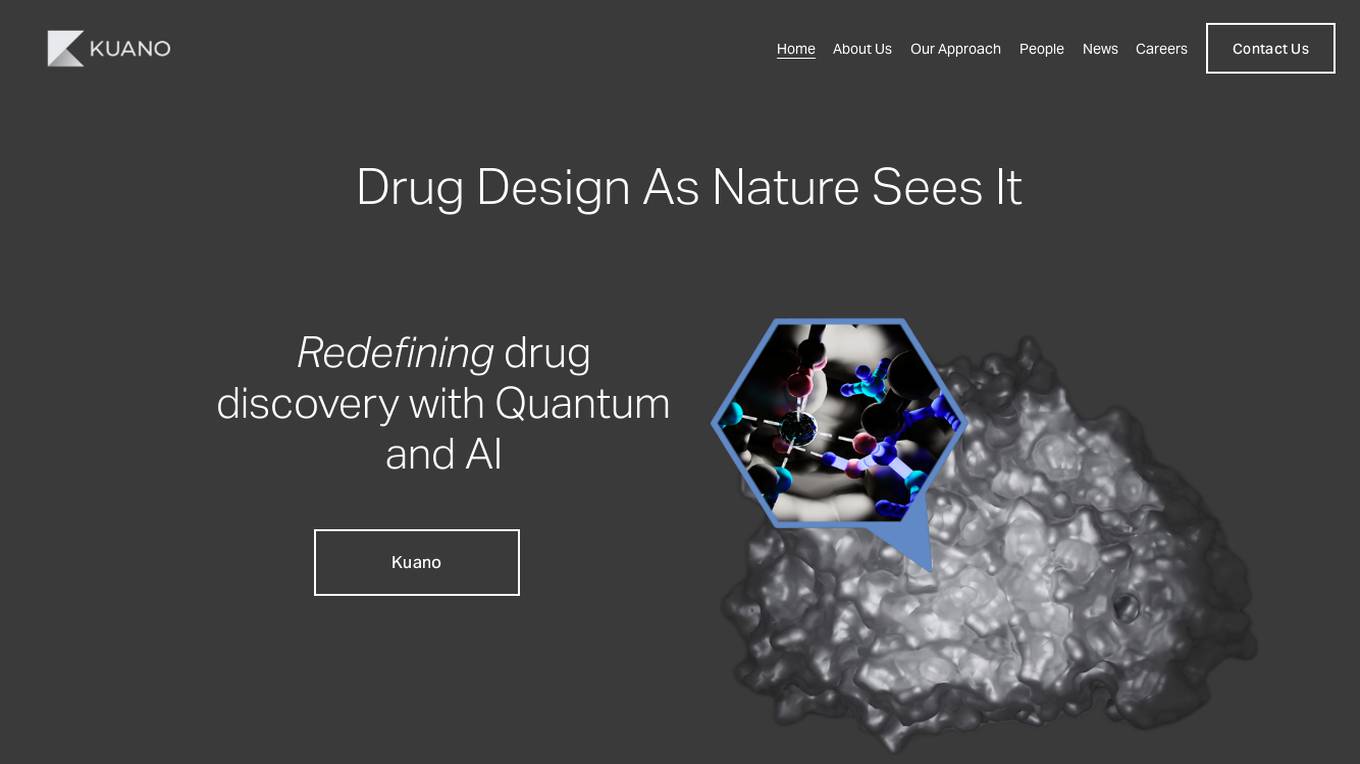
Kuano
Kuano is an AI tool that focuses on redefining drug discovery using Quantum and AI technologies. The platform offers world-class scientific expertise in quantum physics, AI, and medicinal chemistry to revolutionize the drug design process. Kuano aims to leverage cutting-edge technologies to accelerate the discovery of new drugs and improve healthcare outcomes.
1 - Open Source Tools
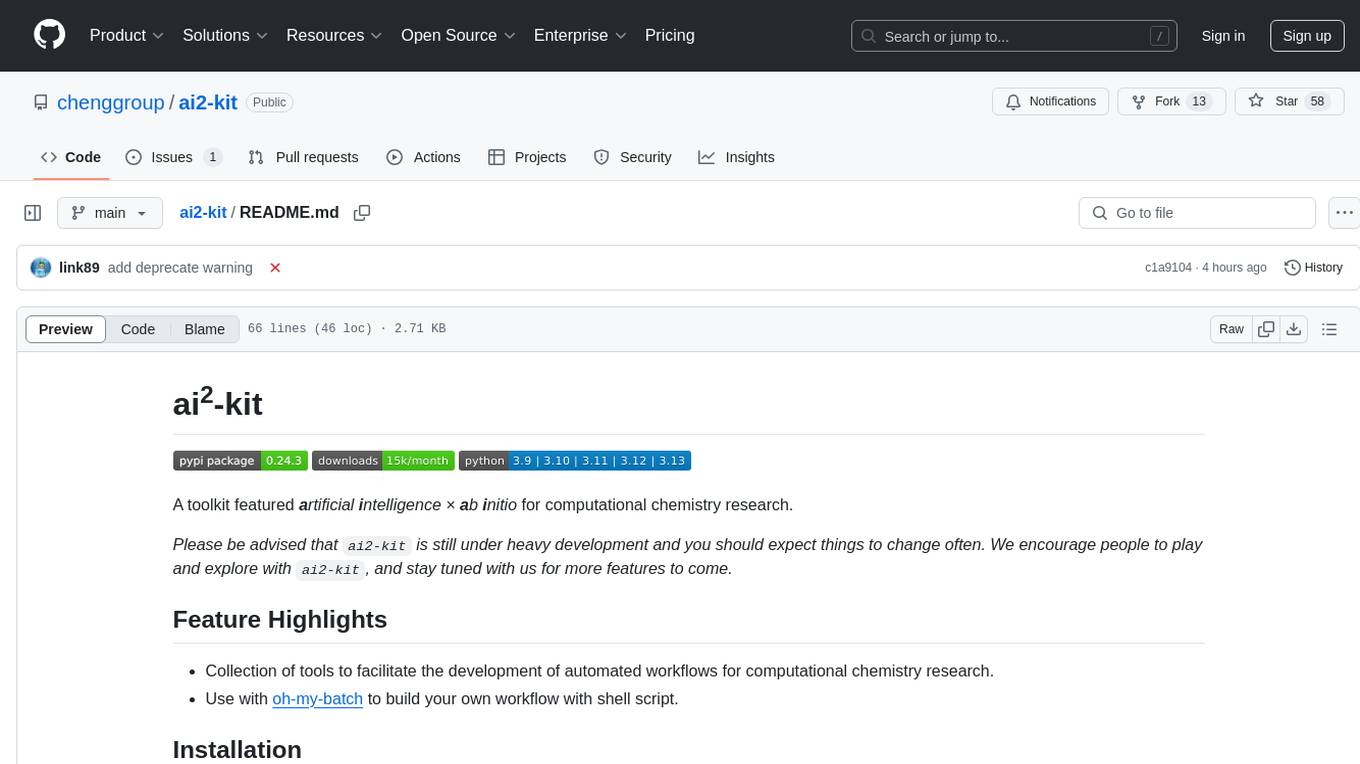
ai2-kit
A toolkit for computational chemistry research, featuring tools to facilitate automated workflows. Includes tools for NMR prediction, dynamic catalysis research, proton transfer analysis, amorphous oxides structure analysis, reweighting, and more. Users can install 'ai2-kit' via pip and explore various domain-specific and general tools for processing system data and filtering structures by model deviation.
18 - OpenAI Gpts
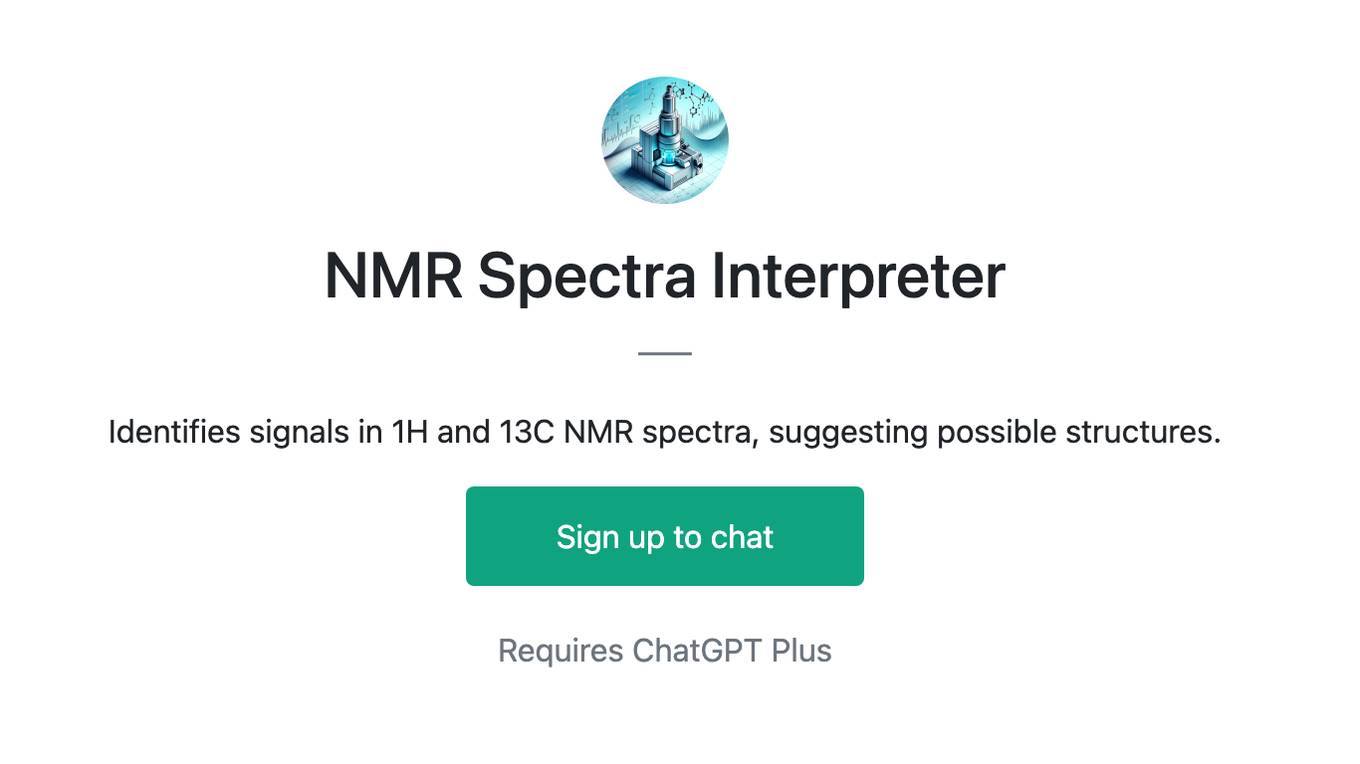
NMR Spectra Interpreter
Identifies signals in 1H and 13C NMR spectra, suggesting possible structures.
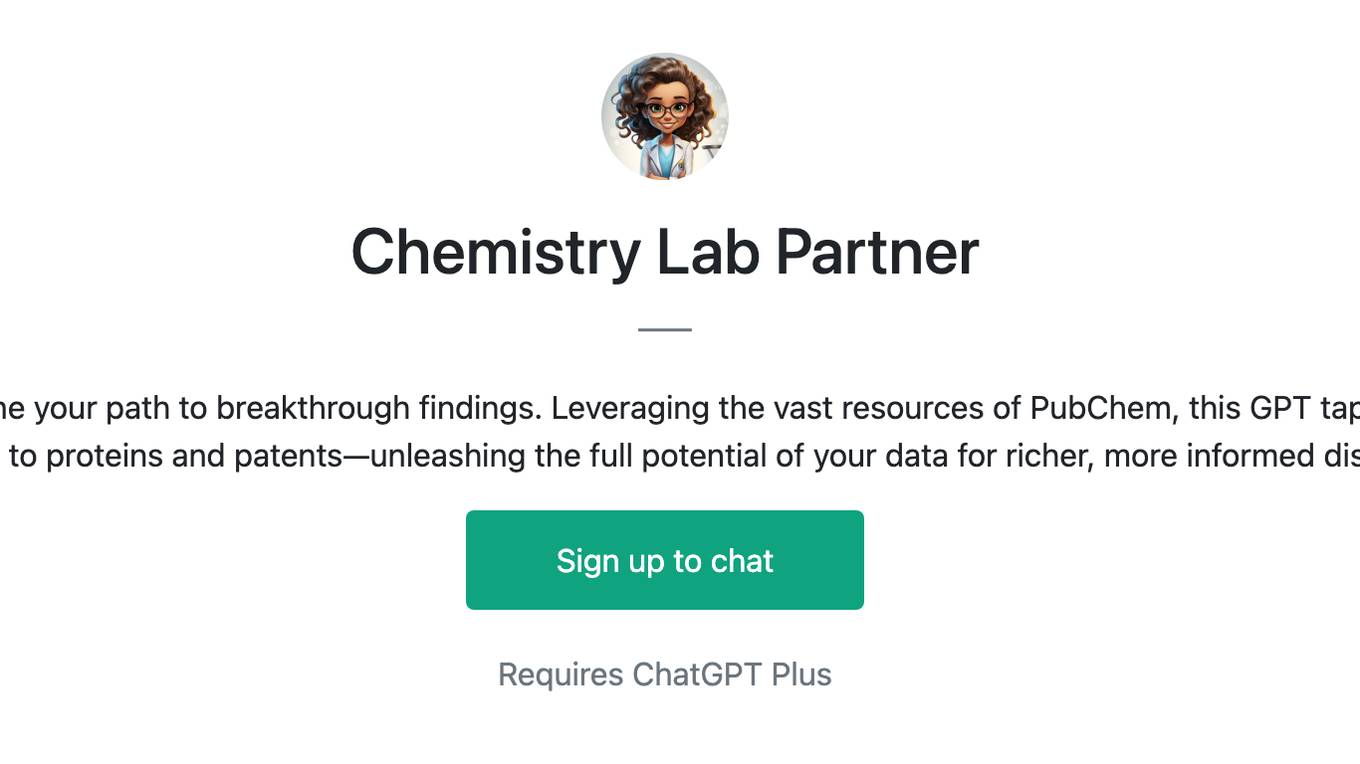
Chemistry Lab Partner
Turbocharge your research and streamline your path to breakthrough findings. Leveraging the vast resources of PubChem, this GPT taps into a wealth of chemical data—from substances to proteins and patents—unleashing the full potential of your data for richer, more informed discoveries.
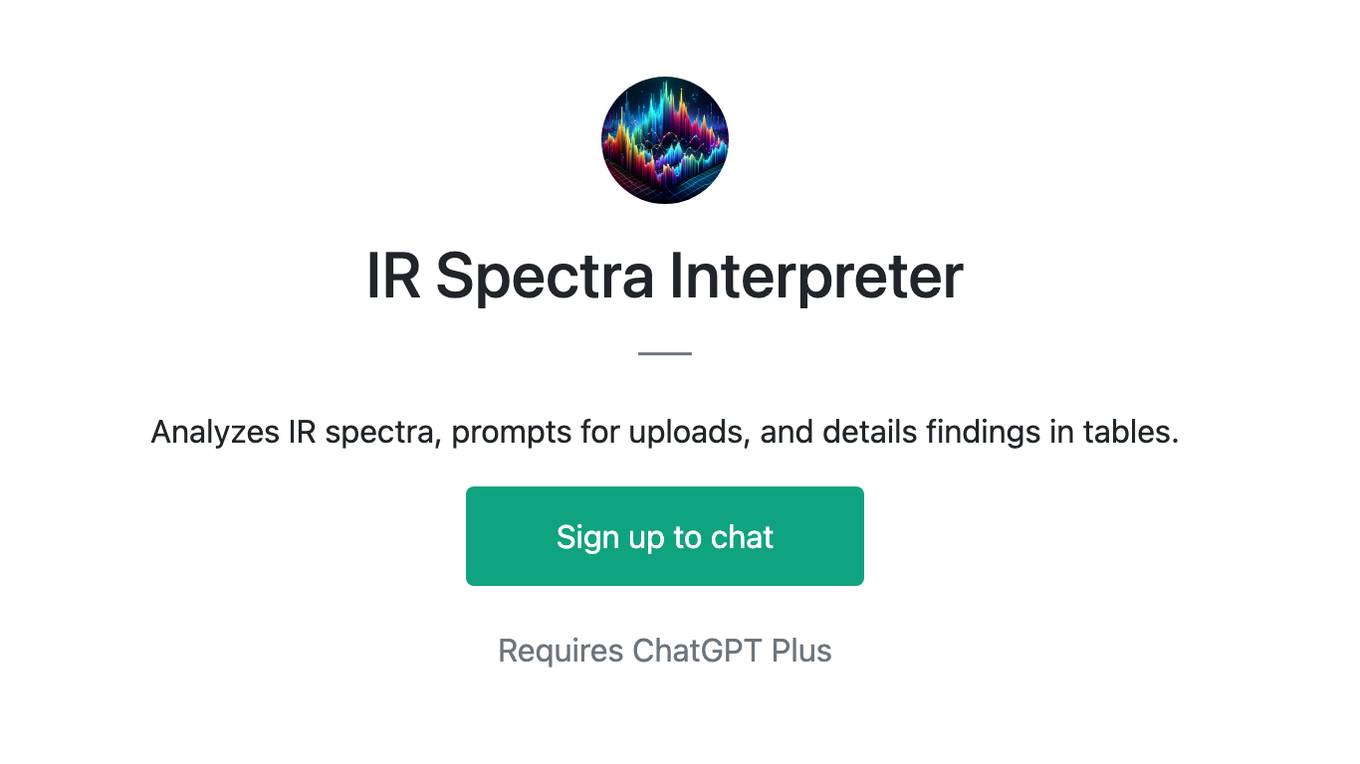
IR Spectra Interpreter
Analyzes IR spectra, prompts for uploads, and details findings in tables.
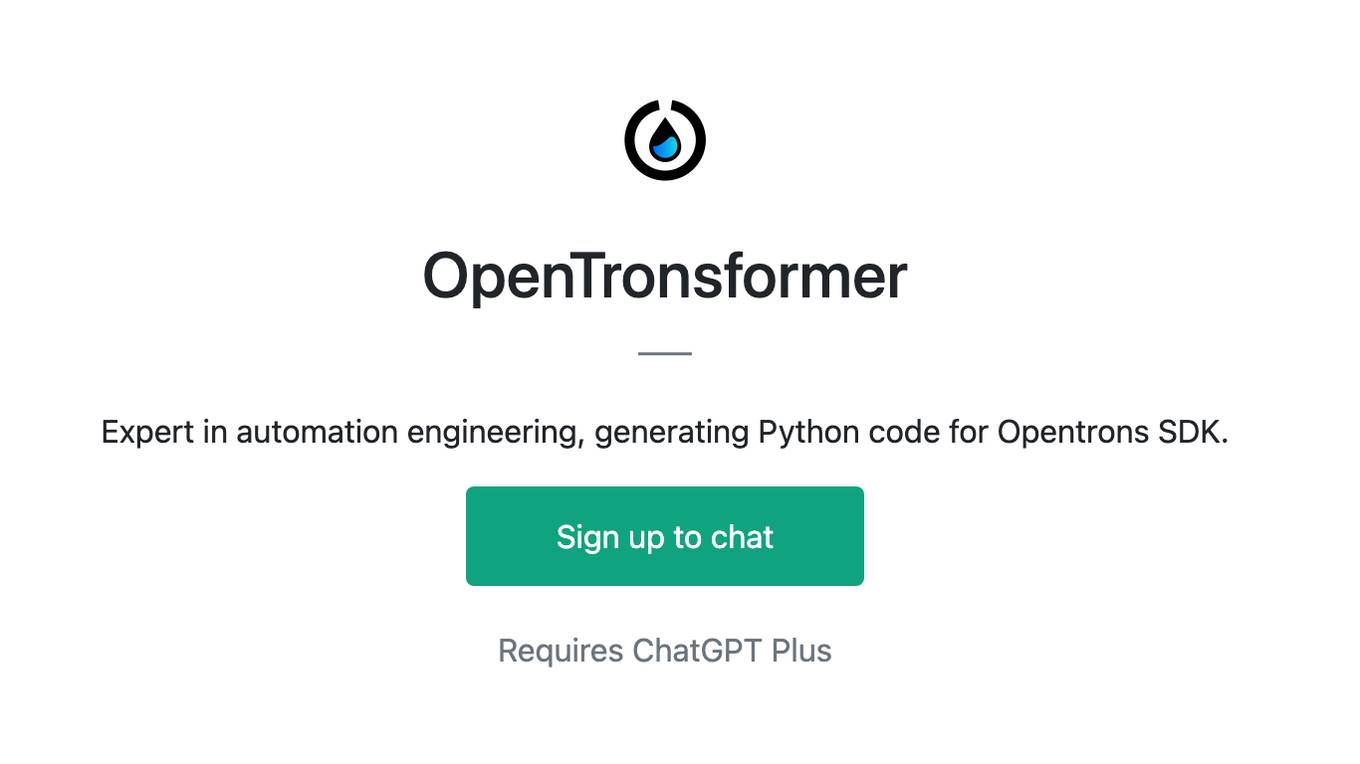
OpenTronsformer
Expert in automation engineering, generating Python code for Opentrons SDK.
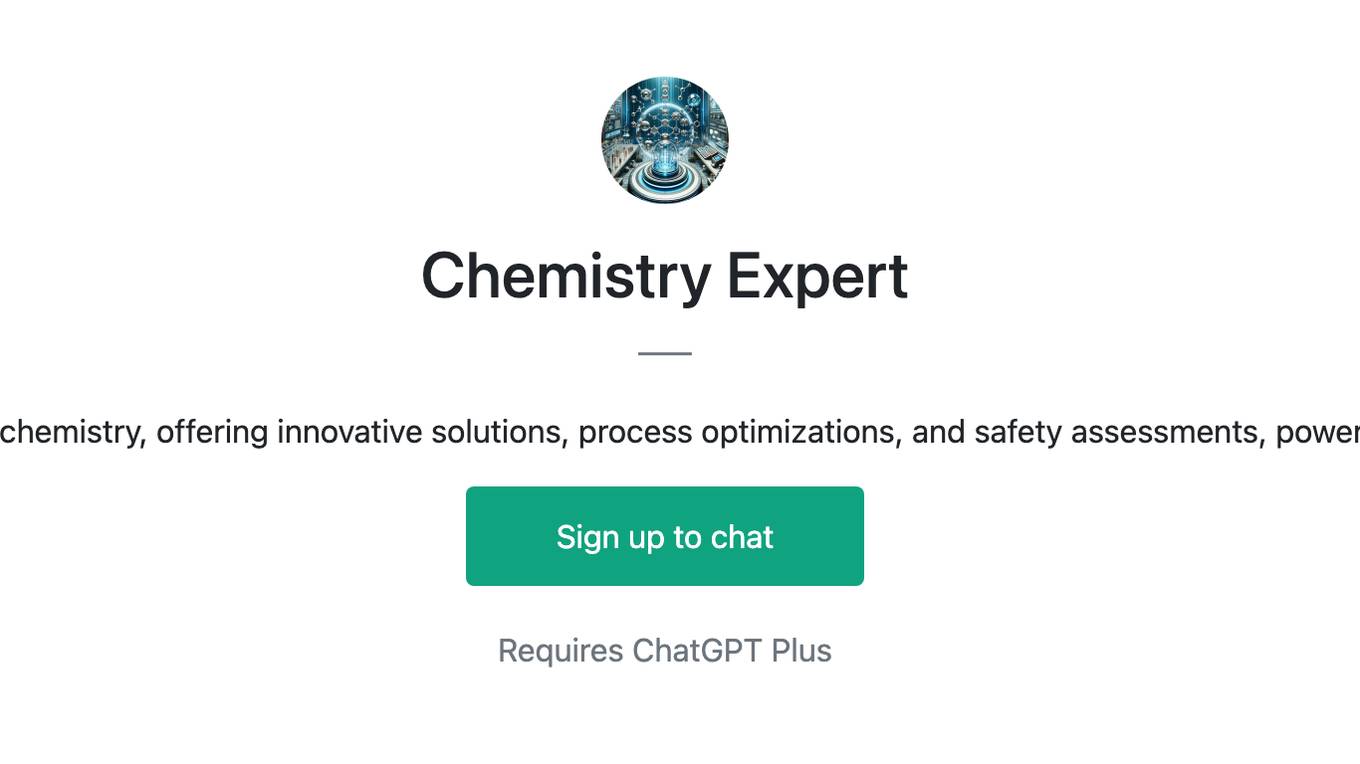
Chemistry Expert
Advanced AI for chemistry, offering innovative solutions, process optimizations, and safety assessments, powered by OpenAI.
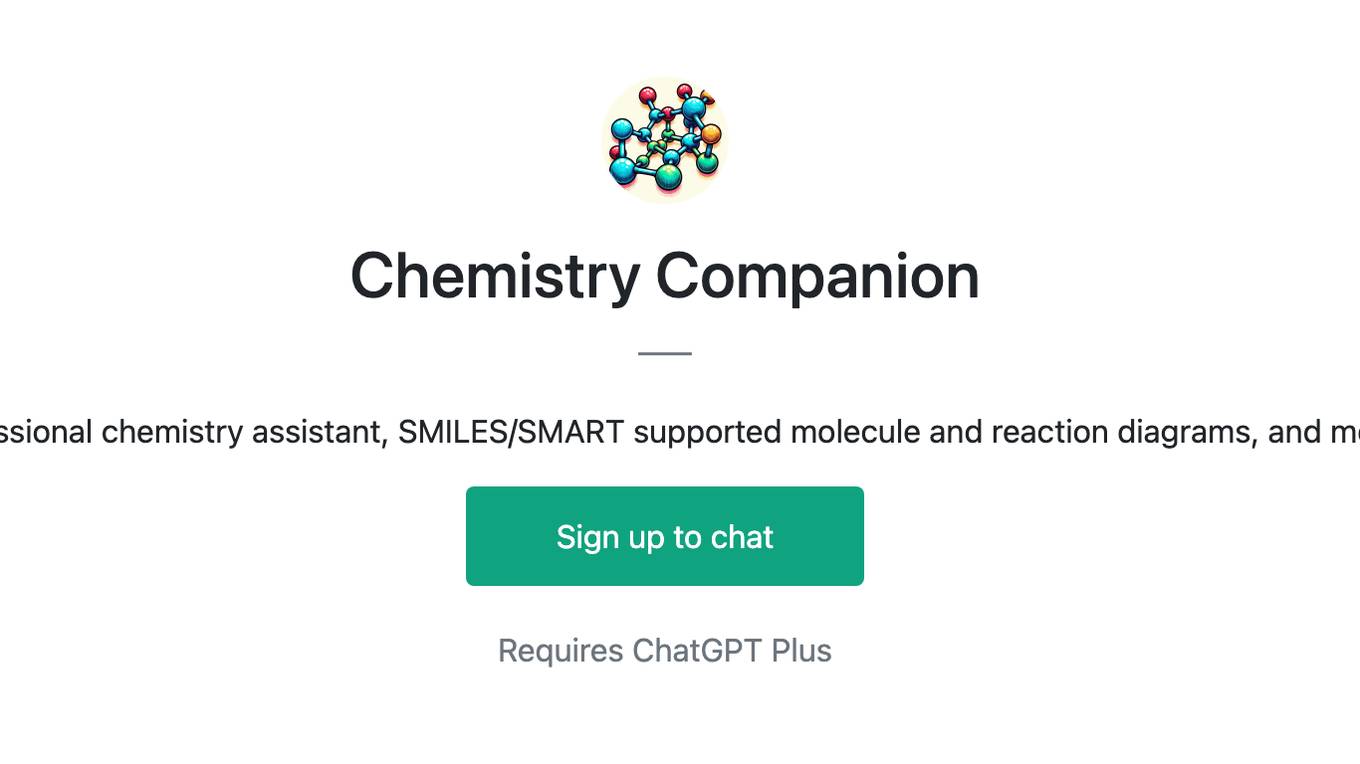
Chemistry Companion
Professional chemistry assistant, SMILES/SMART supported molecule and reaction diagrams, and more!

Formula Generator
Expert in generating and explaining mathematical, chemical, and computational formulas.
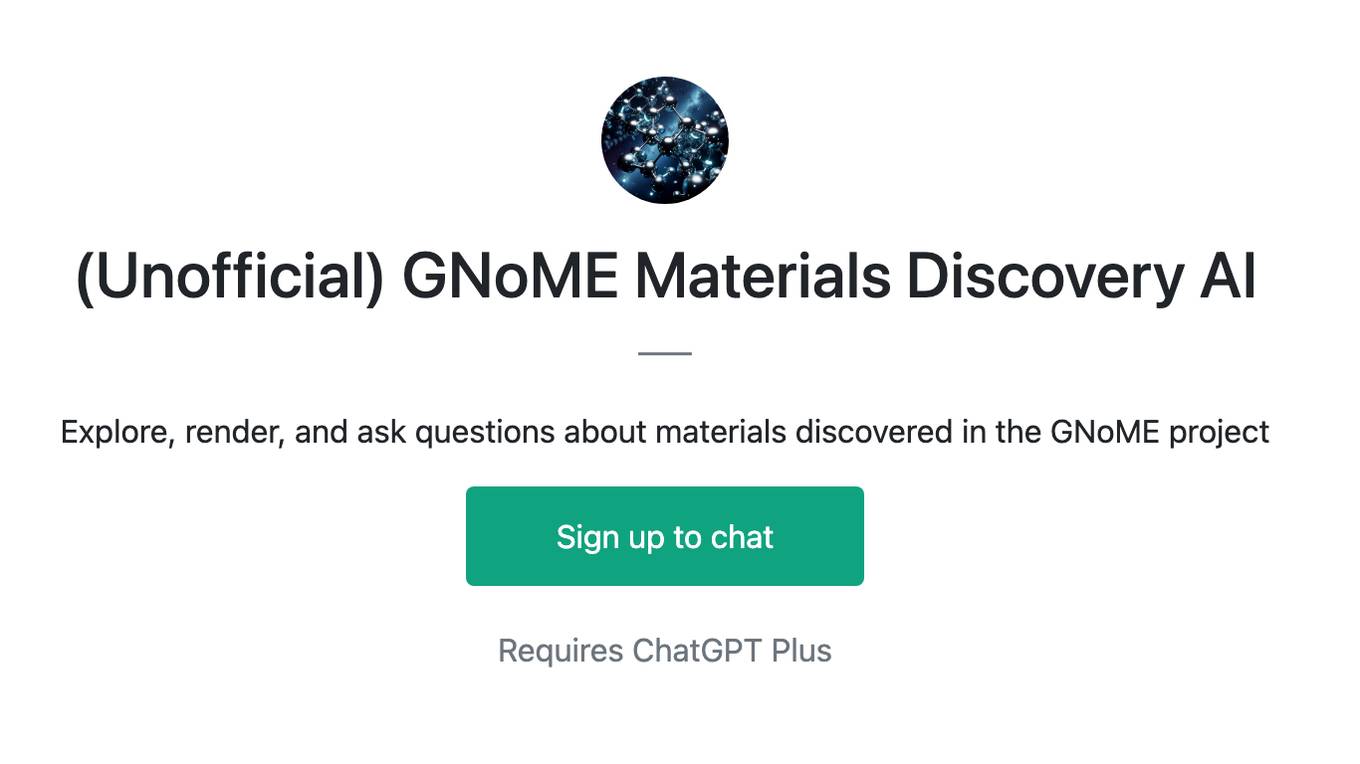
(Unofficial) GNoME Materials Discovery AI
Explore, render, and ask questions about materials discovered in the GNoME project
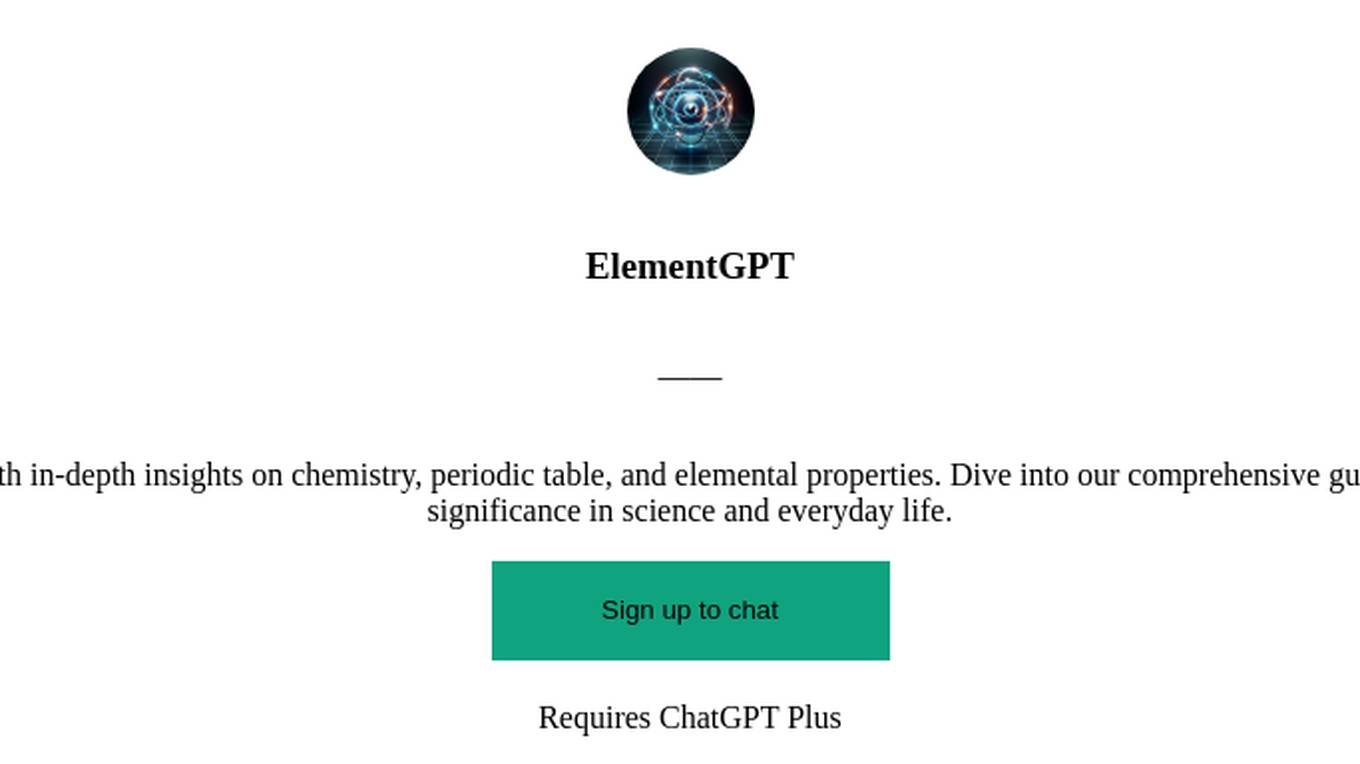
ElementGPT
Explore the fascinating world of elements with in-depth insights on chemistry, periodic table, and elemental properties. Dive into our comprehensive guide for a deeper understanding of the elements' significance in science and everyday life.

Chimica
Questo programma fornisce spiegazioni chiare su un'ampia gamma di argomenti di chimica. Gli utenti possono imparare tutto, dai concetti di base della chimica alle teorie più complesse. È stato progettato per rendere la chimica facile da capire per tutti.
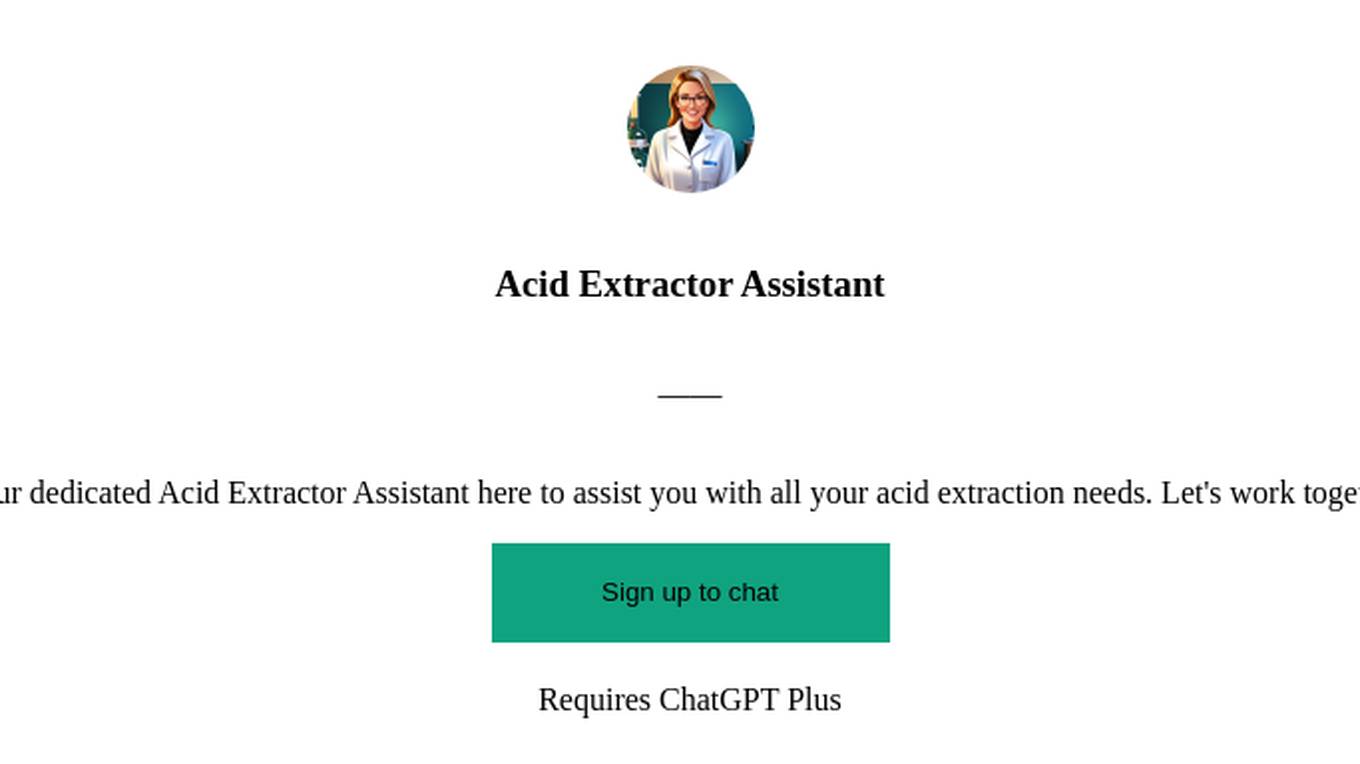
Acid Extractor Assistant
Hello Acid Extractor! I'm your dedicated Acid Extractor Assistant here to assist you with all your acid extraction needs. Let's work together for successful extractions!

